
The City of Delta acknowledges that we are on the shared, traditional, ancestral, and unceded territories of the scəwaθən (Tsawwassen), xʷməθkʷəyəm (Musqueam), and other Coast Salish Peoples. We extend our appreciation to these First Nations for the opportunity to enjoy this land together.
3 City of Delta 2023 Annual Report TABLE OF CONTENTS Message from Mayor and Council 4 Delta City Council 5 City Manager's Report 6 About Delta 8 Delta in Numbers 10 Organizational Structure 12 Department Overviews 13 Office of the City Clerk 14 Corporate Services 16 Delta Police 18 Development 20 Engineering 22 Finance 24 Fire & Emergency Services 26 Human Resources 28 Parks, Recreation & Culture 30 Property Use & Compliance 32 2023 Audited Consolidated Financial Statements 34 Management's Report 34 Independent Auditor's Report 35 Consolidated Statement of Financial Position 38 Consolidated Statement of Operations 39 Consolidated Statement of Net Financial Assets 40 Consolidated Statement of Cashflows 41 Notes to the Consolidated Financial Statements 42 Segmented Information – 2022 and 2023 54 Supplementary Information 58 Permissive Tax Exemptions – 2023 62 Community Banner Contest Winners 64 Earth Day Photo Contest Winner 66
MESSAGE FROM MAYOR AND COUNCIL
As Mayor and Council, we are proud to present the 2023 Annual Report for the City of Delta. This report provides a detailed account of Delta’s financial records and highlights our significant achievements over the past year.
Thanks to the support of City staff, 2023 was another successful year where we continued to advance our priorities, while navigating inflation and other new challenges. We supported new events, took steps to build housing faster in our community, made substantial investments in our recreation and sports infrastructure, and adopted plans to set priorities and guide our future work. To help us achieve these plans, we welcomed City Manager, Donny van Dyk, whose leadership has been instrumental.
We continued our efforts to foster community connections by adding new events alongside our many longstanding and recurring events. Notably, we acquired the Ladner Village Market for the 2024 and 2025 seasons and supported the inaugural Barnside Harvest Festival, which will return in 2024 with much anticipation and excitement.
Housing remains a major issue not just in Delta, but across the province. In the fall of 2023, Delta was selected as one of ten municipalities to receive a provincial housing target. In response, Council approved an action plan to achieve this target with work already underway, including bylaw amendments and process improvements. A key step was commencing a major update to Delta’s Official Community Plan – work that is currently well underway – to further support sustainable housing growth in Delta.
We made significant progress on major capital projects for recreation amenities and sports infrastructure. These include the new Winskill Park lawn bowling green and fieldhouse, completion of the Ladner Leisure Centre roof upgrades, and the replacement of the synthetic turf field and lighting upgrades at North Delta Community Park.
Thanks to a $16 million grant from the provincial government’s Growing Communities Fund, we are undertaking additional projects in 2024 to serve our growing community, including a new synthetic turf field at Mackie Park and improved track and field facilities at Delta Secondary School and Seaquam Secondary School.
With the completion of Delta’s Master Cycling Plan, 44 Avenue Road Improvements, and other road and cycling upgrades, the City is actively working towards making our streets safer for pedestrians and cyclists. Staff are also developing Delta’s Vision Zero strategy, a plan to help reduce fatalities and serious collisions, improve active transportation connections to schools and community services, and address the needs of older adults and vulnerable road users.
We’re grateful for the City’s relationships with community partners, helping us identify local gaps to serve our community better. Additionally, our strong partnerships with local business associations and the Delta Chamber of Commerce support our ongoing efforts to build and sustain a tremendous local business community across the City.
As we reflect on 2023, we’re incredibly appreciative of the dedication and hard work of City staff and community members alike. Together, we have made meaningful progress and set a strong foundation for the future. Thank you for your continued support and engagement as we work towards a healthier, safer, and more sustainable Delta.
4
DELTA CITY COUNCIL
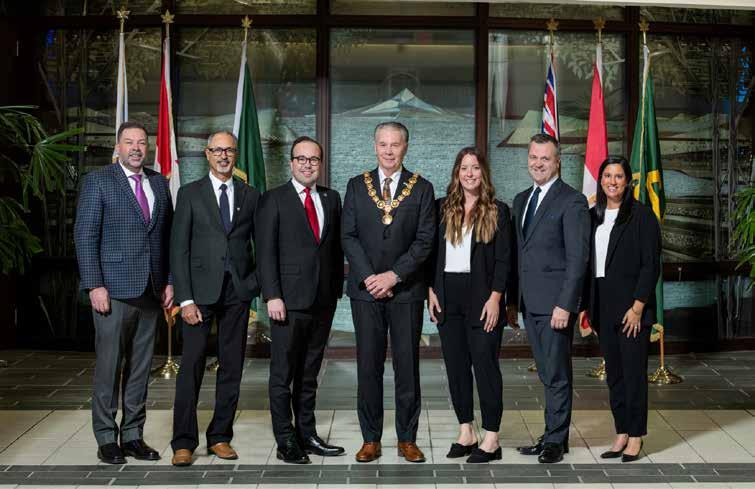
From
Councillor Daniel Boisvert, Councillor Jessie Dosanjh, Councillor Dylan Kruger, Mayor George V. Harvie, Councillor Alicia Guichon, Councillor Rod Binder, Councillor Jennifer Johal
5 City of Delta 2023 Annual Report
left to right
CITY MANAGER'S REPORT

It is a pleasure to present the City of Delta’s 2023 Annual Report, highlighting the important work being done across the City to serve our residents.
Under the leadership of Mayor George V. Harvie and Delta Council, 2023 saw Delta staff continue to deliver on the core municipal services that residents rely on, while also moving forward on new projects and priorities to advance the City’s vision and goals. We have an amazing team, and I am immensely proud of the work being done each day to make Delta the best community possible.
Addressing housing needs across the city is a major priority, and we have already taken steps to deliver on the target of 3,607 net new units in the next five years, as set by the Province. Council has approved an action plan and important work, like bylaw amendments and reductions in permitting times, is underway.
Throughout the year, our dedicated staff stepped up to face a number of emergency and weather related events. From seasonal winter and flood preparedness, to supporting our local farmers through a challenging summer, City staff responded quickly to changing conditions. Additionally, Delta Firefighters answered the call when the BC Wildfire Service requested support in the Interior and were deployed to West Kelowna to perform tactical patrols to locate and extinguish fires.
Looking back at 2023, there are a few specific achievements I want to highlight:
We defined overarching goals and priorities to help inform the work of Council and staff. These goals centered on five key themes: Build Housing and Grow Sustainably, Enhance Recreational Facilities, Lead Responsibly, Build an Inclusive and Safe Community, and Create a More Vibrant Community.
We developed new strategic plans in a number of key areas, producing a new Accessibility Plan, Agricultural Plan, Cycling Master Plan, Social Action Plan, and Rental and Tenant Protection Policies.
We took additional steps to reduce development barriers, including significant reductions in building permit processing times, expanding our online application options, updating bylaws and delegating certain decisions to staff to expedite approvals processes.
We ratified both the Fire and CUPE memorandums of agreement and achieved a Certificate of Recognition audit score of 94% from WorkSafeBC.
The past year has been one of change and growth in Delta. It is important we continue to keep up with our expanding population and provincial expectations, while also maintaining the City’s unique identity and core municipal services. Since starting in the role of City Manager in September of 2023, I have been continually impressed by this city, the leadership of Council and hardworking and dedicated staff, and by the residents who care so deeply about their community. In 2024, I look forward to taking further steps to achieve the City’s goals and build on our reputation as a vibrant, safe and welcoming community here in Delta.
 Donny van Dyk City Manager
Donny van Dyk City Manager
6
• • •
•

Vancouver International Airport (Y VR)
Downtown Vancouver
26 km
Richmond
Salish
Population ~110,000 Residents
Tilbur
Sea of
8,465 hectares (20, 917 acre s) of active farmland
Ladner
Total Land Area
18,000 hectares (44,479 acres)
Musqueam First Nation No. 4
Roberts Bank Terminal largest cont ainer ter minal in Canada + largest coal port on West Coast N. Americ a
Tsaw wassen First Nation
Delta City Hall
Tsaw wassen
FraserRiver
y/Nordel industrial area (~80 0 hect ares / ~1,977 acre s)
Tsaw wassen Ferr y Terminal
US A Border (Point Robert s)
About Delta
Surrey
Annacis
industrial area (~525 hect ares / ~1,297 acres)
North Delta
Burns Bog
~3, 000 hectares (7413 acres) of protected wetlands (8x larger than Stanley Park)
US A Border (Peace Arch)
26 km
Boundary Bay Airport
67 km of dikes and seawall protect Delta from flooding
Boundary Bay
A large part of the 20,682 hectare Fraser River Delta Ramsar Site, the highest designation for the protection of wetlands, is in Delta. These areas are critical feeding stopovers on the Pacific Flyway for migrator y birds. The Fraser River Delta Ramsar Site includes:
• South Arm Marshes Wildlife Mangement Area
• Boundar y Bay Wildlife Management Area
• Alaksen National Wildlife Area on Westham Island
• Burns Bog
• Incorporated 1879 •
North Delta
North Delta is a bustling community full of businesses, shops, restaurants, arts and culture. In the midst of the bustle is the Delta Nature Reserve and Burns Bog, the largest raised bog in North America. With fantastic sport parks, recreation centres, and Delta’s biggest park, Watershed Park, North Delta is a key recreational destination.
Ladner
Ladner is a heritage fishing village situated next to the Fraser River. It is home to the civic precinct, including Delta City Hall and Delta Hospital. Ladner is the main hub of Delta’s agriculture industry, with Westham Island offering a scenic tour of some of Delta’s most popular farms and roadside farmstands. Historic buildings, such as Harris Barn on Arthur Drive, line Ladner’s roads, and it is a popular destination for bird lovers due in part to the George C. Reifel Bird Sanctuary.
Tsawwassen
A beachside town located next to the US/Canada border and BC Ferries terminal, Tsawwassen is a tourist destination and a beach paradise for locals. The town features natural spaces, including Boundary Bay Regional Park and Fred Gingell Park, and many recreational opportunities, including golfing and water sports. It offers a mix of housing and businesses, as well as a central shopping corridor with local boutiques and more.
DELTA IN NUMBERS
Delta’s Assessed Value for the Year 2023 (in $)
Assessed
and
Comparison for the year 2023
Land Area – Square Kilometres
2021 Number of Dwellings
10
Total
Value
Municipality
Municipalities Total General Purposes Assessed Value (in $) Vancouver 465,670,372,763 Surrey 256,351,347,088 Burnaby 146,522,747,198 Richmond 136,159,338,195 Langley Township 78,605,529,376 Coquitlam 77,132,247,208 Delta 63,028,705,706 District of North Vancouver 61,395,319,007 West Vancouver 56,173,436,291 Maple Ridge 38,998,263,364 City of North Vancouver 33,153,589,748 New Westminster 30,846,328,709 Port Coquitlam 29,317,343,843 Port Moody 18,891,228,739 White Rock 13,336,240,441 Langley City 13,100,696,356 Pitt Meadows 9,192,633,407 Bowen Island 3,723,304,179 Anmore 1,984,145,400 Lions Bay 1,296,271,195 Belcarra 795,593,200 Delta 180 sq km Remainder of Metro Vancouver 2,883 sq km Utilities 30,706,395 0.05% Major Industr y 816,837,600 1.30% Recreational 75,418,600 0.12% Farm 44,858,947 0.07% Light Industry 6,530,775,700 10.36% Business / Other 9,859,615,369 15.64% Residential 45,670,493,091 72.46% Supportive Housing 4 0.00% Delta 39,736 Remainder of Metro Vancouver 1,027,613
Population Growth 2016 – 2021

11 City of Delta 2023 Annual Report
2016 2021 % Growth Total 102,238 108,455 6.1%
ORGANIZATIONAL STRUCTURE
Delta Residents, Property Owners, & Businesses
Mayor & Council
Advisory Bodies
(Appointed by Council)
Office of the City Clerk
Human
Delta Police Board
Office of the City Manager Finance Property
Chief Constable
12
Use & Compliance
Culture
Engineering Corporate Services Parks, Recreation &
Resources
Development
& Emergency Services
Fire
DEPARTMENT OVERVIEWS

13 City of Delta 2023 Annual Report
OFFICE OF THE CITY CLERK
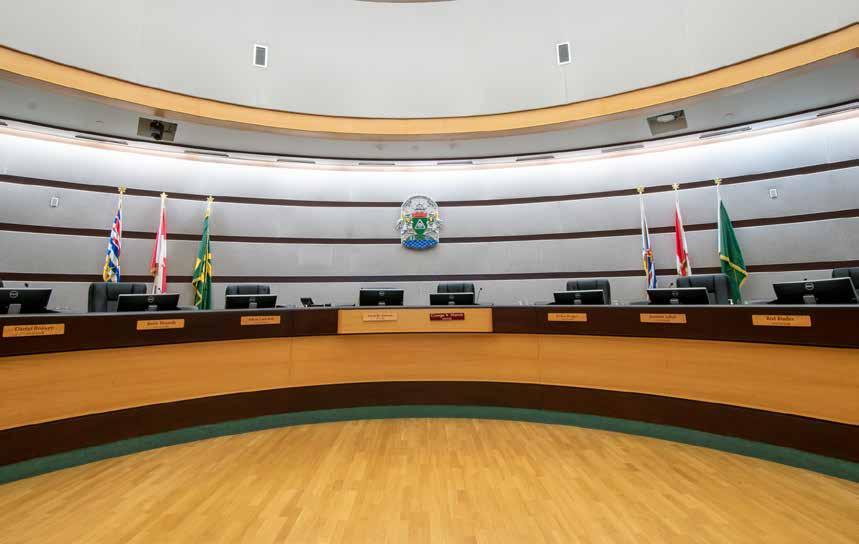
DEPARTMENTAL OBJECTIVES
Objectives:
• Carry out the statutory responsibilities of the Corporate Officer as legislated under the Community Charter
• Prepare Council and Committee Agendas
• Record official minutes
• Administer and certify Bylaws
• Execute legal documents on behalf of the City
• Administer local government and school district elections
• Process Freedom of Information and Protection of Privacy requests
• Preserve and manage all corporate records
Measuring Objectives:
• Administer City Council and Committee meetings with integrity and transparency
• Prepare complete meeting agenda materials and record accurate meeting minutes
• Ensure legislative process is adhered to in accordance with the Community Charter and Local Government Act as it relates to meeting protocol, bylaw readings, public notification, and statutory advertisements
• Conduct successful General Local Elections every four years, including any by-elections or referenda
| Department Overviews
14
WHO WE ARE
The Office of the City Clerk serves as the secretariat for Council and its various appointed bodies. We are dedicated to providing the highest level of professional service to Council, staff, and the residents of Delta. The Office of the City Clerk strives to provide legislative services expeditiously while ensuring the City of Delta meets all legislative requirements of the Community Charter, Local Government Act, and Freedom of Information and Protection of Privacy Act.
WHAT WE DO
The Office of the City Clerk is responsible for the facilitation of all Council and Committee meeting logistics including preparing complete agendas and recording accurate official minutes. As administrators of City Council business, we ensure that the democratic process is conducted with integrity and transparency in accordance with the powers, duties, and functions of the Corporate Officer as legislated by the Community Charter. A core function of the Office of the City Clerk is to preserve official City records. Moreover, the Office of the City Clerk responds to information requests in accordance with the Freedom of Information and Protection of Privacy Act
WHAT WE’RE PROUD OF 2023 Achievements / Outcomes
As custodian of the City’s corporate seal, the City Clerk executes legal documents on behalf of Delta, and certifies bylaws and other documents as required. As authorized by the Community Charter, the City Clerk conducts oaths and takes affirmations, affidavits and declarations as required.
As Chief Election Officer, the City Clerk acts independently as a non-partisan member of the City’s leadership team and is responsible for the administration of general local elections, by-elections, and referenda in accordance with the Local Government Act.
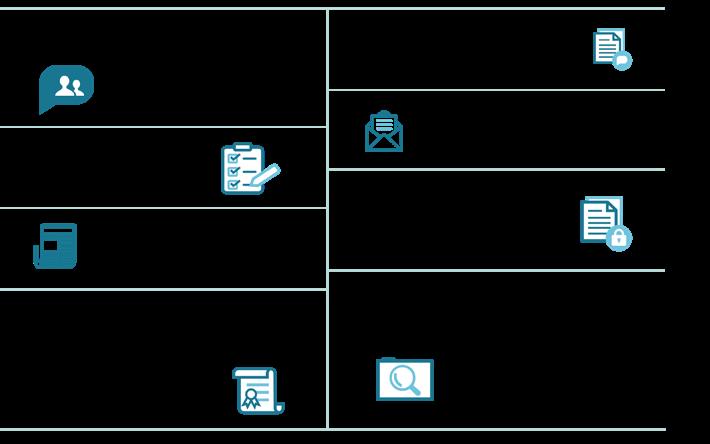
15 City of Delta 2023 Annual Report
CORPORATE SERVICES

DEPARTMENTAL OBJECTIVES
Objectives:
• Provide analysis and advice to Mayor and Council and the City Manager in support of key corporate objectives and matters, including intergovernmental and interagency relations, climate action, social initiatives, lands matters, legal issues and risk management, and strategic planning
• Collaborate and liaise with City staff, community groups, and residents on matters and concerns pertaining to these core areas
WHO WE ARE
Measuring Objectives:
• Coordinate and provide support for City initiatives guided by Council direction
• Advance key goals of the municipality as outlined in City of Delta strategic plans
• Understand issues that affect the City and its residents through regular engagement with key stakeholders, members of the community, and senior government staff and agencies
• Manage the City’s lands portfolio
• Provide a high level of service to Mayor and Council, residents, and staff
Corporate Services supports the City's key initiatives and core deliverables. Corporate Services consists of five separate but inter-related divisions:
• Corporate Policy
• Social Planning
• Legal Services
• Climate Action and Environment
• Lands Management
| Department Overviews
16
WHAT WE DO
Corporate Policy oversees corporate initiatives and intergovernmental projects and programs. This section is responsible for coordinating Delta’s business planning services and bylaw development, organizing municipal representation and policy briefings for the Union of BC Municipalities and the Federation of Canadian Municipalities, and collaborating with Tsawwassen First Nation, and Federal and Provincial Ministers. Corporate Policy is also responsible for tourism services and local business associations in Delta.
Legal Services provides advice to Council, Directors, and staff on a broad range of issues that affect Delta, manages Delta’s insurance program, and handles claims.
WHAT WE’RE PROUD OF 2023 Achievements / Outcomes
Social Planning is responsible for implementing Delta’s Social Action Plan, including targeted initiatives related to housing, addiction services, seniors, youth, and health. Social Planning focuses on individuals and their experiences in all aspects of community living, including personal safety, resources for at-risk community members, accessible infrastructure and services, and affordable housing.
Climate Action and Environment coordinates the implementation of Delta’s Climate Change Initiative and chairs the Climate Change Working Group.
Lands Management manages the City’s real property portfolio and provides advice and services to Council, Directors and staff with respect to landrelated matters such as statutory rights of way, park expansion and strategic acquisitions and dispositions.
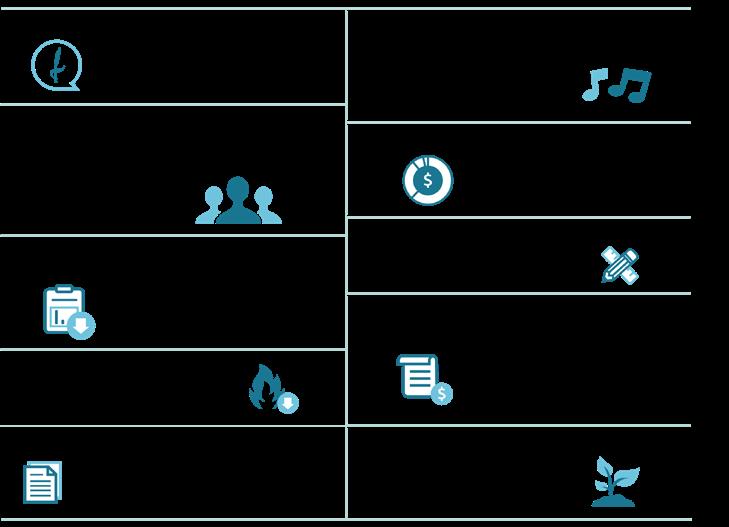
17 City of Delta 2023 Annual Report
DELTA POLICE
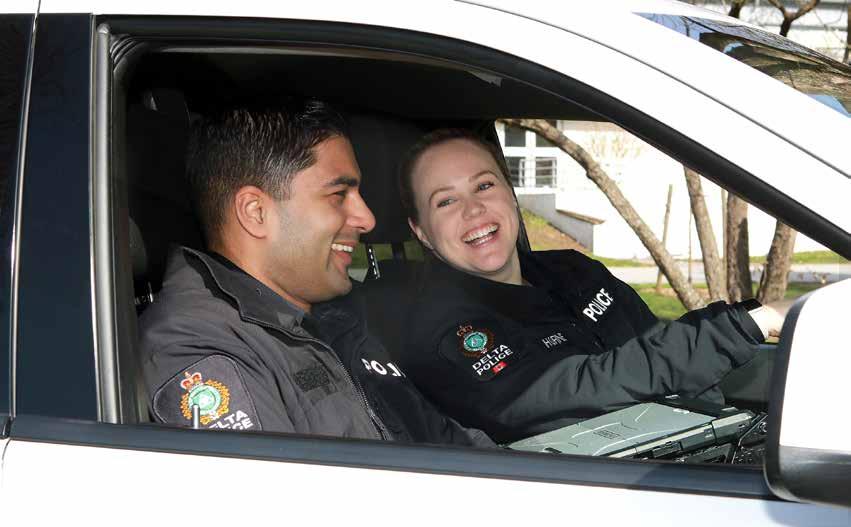
DEPARTMENTAL OBJECTIVES
Investing in our Community:
• Community safety and crime prevention
• Support for mental health and vulnerable individuals
• Road safety for all users
Investing in our Team:
• Excellence through professionalization, technology & innovation
• Equip team to work with diverse community
• Growth and well-being of the team
Learn more about the DPD’s Community Safety and Well-Being Plan at deltapolice.ca
WHO WE ARE
Founded in 1888, the Delta Police Department (DPD) has a long and rich history being one of the first municipal police departments established in British Columbia. Although Delta’s population (and its police department) has grown, Delta remains a police service connected to its community and believes in a “community-first policing” style. The DPD is proud to have provided over 130 years of policing to a community with a changing landscape while never changing our No Call to Small philosophy, which has resonated with the community throughout our history. Approximately 200 police officers and 80 police staff work hard to ensure Delta remains one of the safest communities in BC. Learn more about the DPD at deltapolice.ca/about.
| Department Overviews
18
WHAT WE DO
The DPD provides community-first policing services, prioritizing the needs and expectations of the community while aligning with departmental objectives and the duties and functions outlined in the Police Act1, under the direction of the Delta Police Board. These duties and functions include:
(a) enforce, in the municipality, municipal bylaws, the criminal law and the laws of British Columbia, (b) generally maintain law and order in the municipality, and (c) prevent crime.
WHAT WE’RE PROUD OF
2023 Achievements / Outcomes
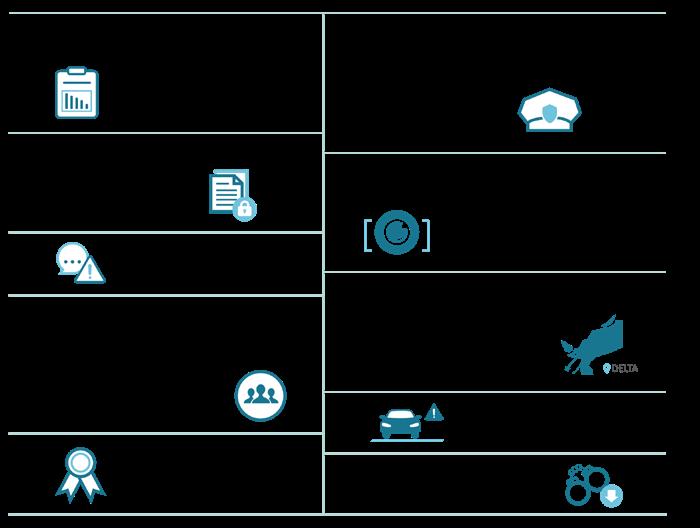
In addition to ensuring community safety and maintaining crime rates significantly lower than regional, provincial, and national averages, the DPD also supports the overall well-being of the community through various initiatives and activities. 1 Police Act S. 26(2)
19 City of Delta 2023 Annual Report
DEVELOPMENT

DEPARTMENTAL OBJECTIVES
Objectives:
• Support Council to establish a vision, policies, and plans for future growth and development
• Provide analysis, information, and advice on community planning, policy, and regulatory matters
• Provide the public timely and efficient services for all forms of applications, permits, inquiries, and concerns
• Facilitate public engagement on a variety of topics affecting the community
WHO WE ARE
Measuring Objectives:
• Prepare the Official Community Plan and associated area and neighbourhood plans
• Prepare plans, polices, and strategies relating to significant community issues, including housing, heritage, agriculture, and sustainable development
• Coordinate applications, zonings, permits, land use issues, building permits and inspections, and technical queries in a timely manner
• Provide opportunities for meaningful public input and engagement on community planning matters including proposed land use changes
Development works with Council and the community to establish future land use plans and associated strategies, and to foster sustainable growth and development that provides a variety of housing choices, employment opportunities, and amenities for residents and visitors alike. The department provides advice to Council on a wide range of policy and regulatory bylaws, strategies, and development applications. The department also provides development application services and support, building permit approvals, and inspection services.
| Department Overviews
20
WHAT WE DO
The Application Centre provides an efficient and proactive “one stop” customer service for building permits, development applications, and general enquiries. The Application Centre tracks building statistics and provides information to the public, other departments, and external agencies regarding Delta’s bylaws and policies.
Community Planning and Development is responsible for Delta’s Official Community Plan, Delta’s Zoning Bylaw, and other regulatory bylaws, as well as various strategies and policies on related topics like housing, heritage, and agriculture. Staff work closely with the development community, other departments, external agencies, and the public to process rezoning, subdivision, and other development applications and make recommendations to Council regarding land development.
WHAT WE’RE PROUD OF 2023 Achievements
/ Outcomes
The Building Approvals section reviews construction drawings for all types of buildings and structures prior to issuing building permits, conducts inspections, and gives advice on building related matters. Building Approvals works in cooperation with other departments, provincial authorities, and in partnership with applicants to ensure that the design and construction of buildings meet health, safety, fire protection, accessibility, and city zoning standards.
The Development Engineering section works closely with applicants to confirm compliance with Delta's Subdivision and Development Standards Bylaw. Development Engineering also provides oversight when upgrades are required to the City's infrastructure systems to support new development, including improvements to transportation, water, sanitary, and storm utility systems.

21 City of Delta 2023 Annual Report
ENGINEERING
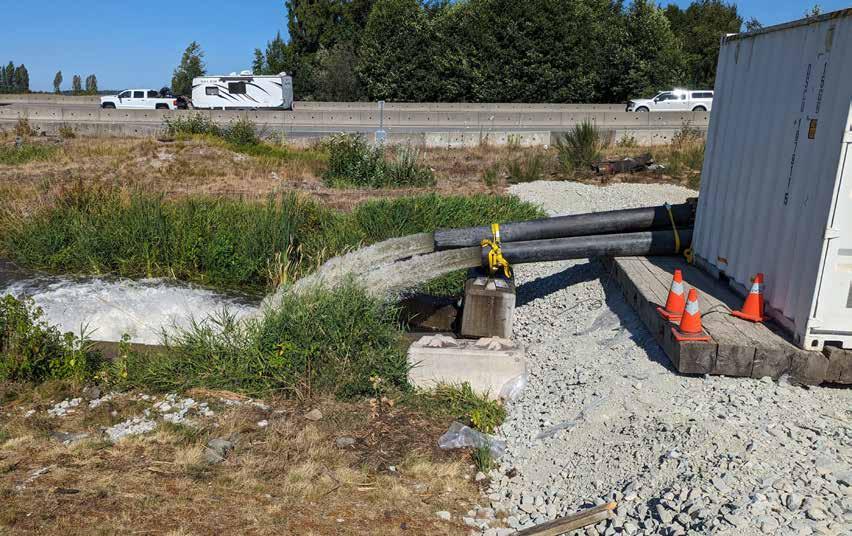
DEPARTMENTAL OBJECTIVES
Objectives:
• Administer sustainable planning and management of city infrastructure through replacement, renewal and maintenance programs
• Ensure efficient and effective delivery of services to Delta residents and businesses through annual work plans
WHO WE ARE
Engineering provides a range of public works services in the areas of transportation, water, sewer, drainage, irrigation, solid waste and recycling. Engineering also maintains the corporate fleet that includes trucks and construction-related equipment.
Measuring Objectives:
• Receive community feedback
• Complete annual work plans
The department includes the following divisions:
• Administrative & Customer Services
• Design & Construction
• Operations
• Special Projects
• Transportation
• Utilities
| Department Overviews
22
WHAT WE DO
Administrative and Customer Services manages the City’s switchboard and reception services and provides customer service support, including processing service requests and preparing public permits related to highway use, tree cutting, lawn watering, hydrant use, special events, and filming.
Design and Construction is responsible for the annual capital infrastructure upgrade program, along with design drafting and corporate survey services, including construction layout and record surveys.
Operations is responsible for providing a range of public works, maintenance, and construction services, including horticultural and tree services, parks and sports field maintenance, and snow and ice control.
WHAT WE’RE PROUD OF 2023 Achievements / Outcomes
Special Projects liaises with external agencies regarding the delivery of key engineering infrastructure projects; responds to steep slope issues; and provides assistance with engineering requirements for land developments and building permit projects.
Transportation provides planning, management, and replacement programs for City transportation infrastructure and related facilities; and plans and budgets for the Neighbourhood Road Improvements Plan.
Utilities provides long-range planning, management and replacement programs for water, sewer, drainage, irrigation and flood protection, and delivers solid waste and recycling services.
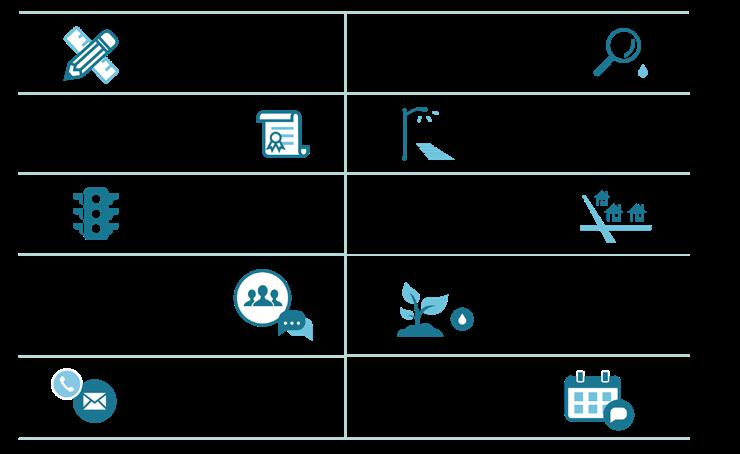
23 City of Delta 2023 Annual Report
FINANCE
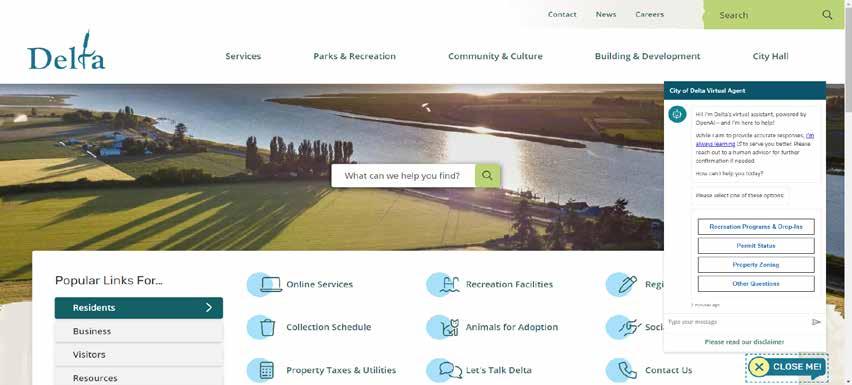
DEPARTMENTAL OBJECTIVES
Objectives:
• Continue to improve the efficiency and quality of our finance processes including streamlining the budgeting process and increasing online service delivery
• Continue the practice of providing fair and transparent bidding opportunities to contractors and consultants
WHO WE ARE
Measuring Objectives:
• Meet statutory requirements for payroll, purchasing, value added taxes, audited financial statements, and the five-year financial plan
• Continue to implement controls and technology to address and mitigate cybercrime
• Maintain and develop modern digital systems that create value for businesses and residents of Delta
Finance is responsible for providing efficient, effective, and responsible financial management services in a customer-focused environment to the public, City Council, and departments. The department consists of three divisions:
• Financial Planning
• Financial Services
• Information Services
| Department Overviews
24
WHAT WE DO
Financial Planning coordinates the preparation of Delta’s annual operating and capital budgets, and manages the City’s investment portfolio. This division is responsible for the billing and collection of utilities and property taxes, as well as the invoicing and collection of other City revenues.
Financial Services maintains the general ledger, processes financial transactions, provides financial reporting for all departments, and processes payments. This area is responsible for overseeing the purchasing of goods and services for the City, including buying for construction projects, as well as controlling the inventory of purchased goods.
WHAT WE’RE PROUD OF 2023 Achievements / Outcomes
Information Services implements, manages, supports, and upgrades the City's computer applications, corporate websites, personal computers and printers, central processing infrastructure, data-centre, data and voice networks, telephone systems, and security systems.

25 City of Delta 2023 Annual Report
FIRE & EMERGENCY SERVICES
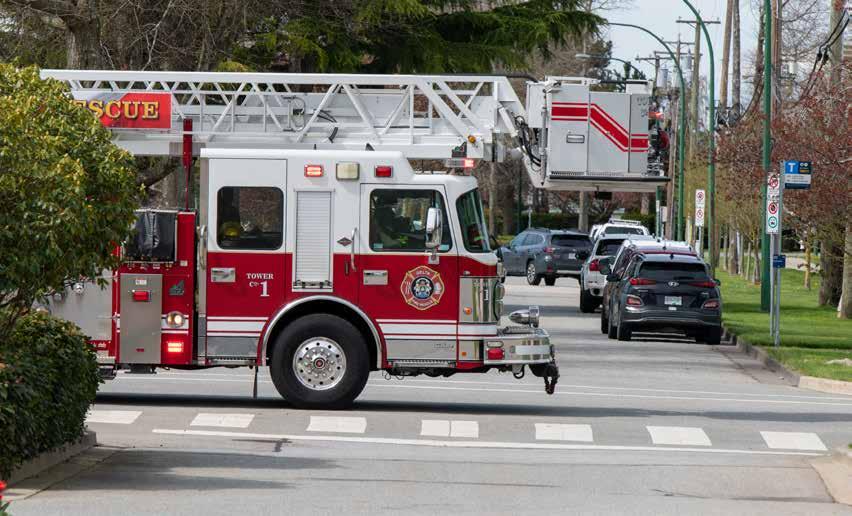
DEPARTMENTAL OBJECTIVES
Objectives:
• Provide excellent service to the residents, businesses, and visitors of Delta through a highly trained, skilled, and efficient force
• Reduce the incidence of injury, loss of life, and property damage by providing public education programs, fire cause investigation, and prevention services to secure public safety and code compliance
WHO WE ARE
• Strengthen partnerships and increase public engagement through communication and community interaction opportunities
• Conform to Government Acts, Regulations, City Bylaws, and policies
Delta Fire & Emergency Services (DF&ES) employs over 200 people, has 19 fire apparatus, 7 fire halls, and a training facility. In addition to fire suppression, DF&ES provides pre-hospital care, rescue activities, hazardous materials response, and many other emergency services in Delta. We work to create safe communities through public education for all ages, fire prevention and inspection services, emergency preparedness, and by working closely with partner agencies and community groups. DF&ES is committed to the health and safety of our staff and community. DF&ES is composed of the following four divisions:
• Operations/Training
• Fire Prevention
• Administration
• Emergency Management
| Department Overviews
26
WHAT WE DO
Operations/Training provides direction, accountability and support to the operations of DF&ES, including radio communications. Our highly-trained firefighters fight fires of all types, and routinely respond to calls for medical assistance, rescues, hazardous material concerns, requests for public assistance, and more.
The Fire Prevention Division is responsible for enhancing the safety of the community through education and enforcement of bylaws, fire and building codes, and any other regulations that try to limit the fire risk that may emerge from social and commercial activities or from the operations of a building. Prevention services include investigations of fires, plan review for new and major developments, developing pre-incident plans,
WHAT WE’RE PROUD OF 2023 Achievements / Outcomes
permitting for fire related activities, and routine fire and life safety inspections of public assembly buildings, construction sites, food trucks, daycares, vacant premises, and other high risk occupancies.
Administration provides human resources, administration, and payroll support for DF&ES personnel and supports the Fire Chief and Delta’s Finance and Human Resources Departments with the annual budget and labour management relations.
The Emergency Management Office ensures the City is prepared for an emergency or natural disaster. The Office is responsible for organizing emergency preparedness training exercises for City staff, external support agencies, and the public, while supporting and promoting volunteer-based emergency management programs and initiatives.
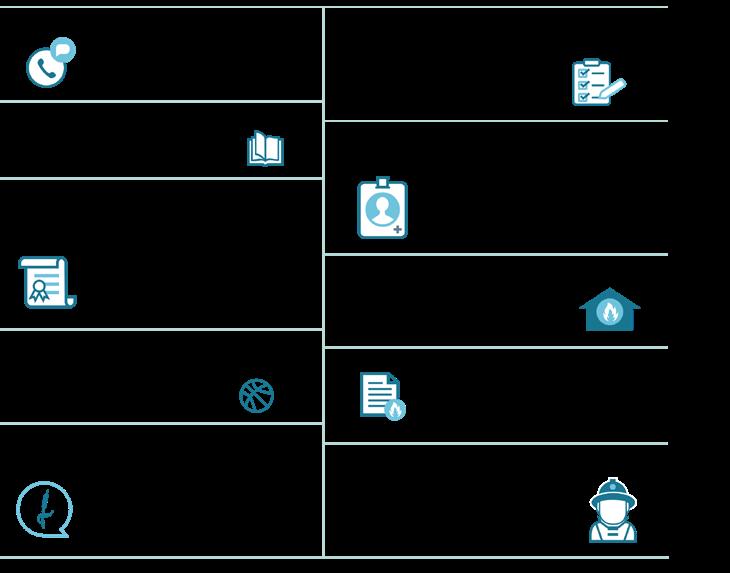
27 City of Delta 2023 Annual Report
HUMAN RESOURCES
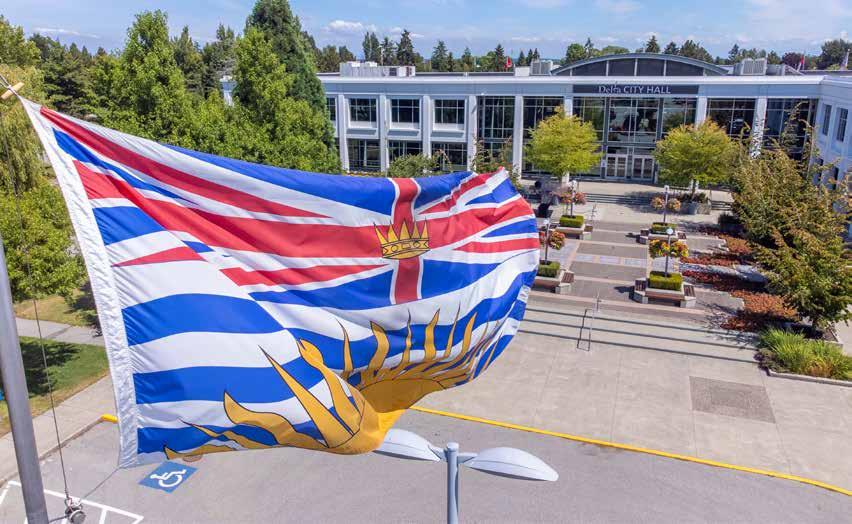
DEPARTMENTAL OBJECTIVES
Objectives:
• Support the City in all Human Resources related functions and assist the organization in meeting strategic objectives
Measuring Objectives:
• Manage Human Resource policies and procedures, recruitment and retention, employee training and professional development, labour relations, claims management, and occupational health, safety and well-being
| Department Overviews
28
WHO WE ARE
Human Resources is responsible for providing support and guidance to City staff, Mayor and Council, and the public on all employment related topics.
WHAT WE DO
Human Resources is responsible for developing and managing corporate programs that support the City and impact employees, including recruitment and selection, labour relations, collective bargaining, equity, diversity, and inclusion, training and development, occupational health and safety, health and wellness, and compensation and benefits.
WHAT WE’RE PROUD OF 2023 Achievements / Outcomes
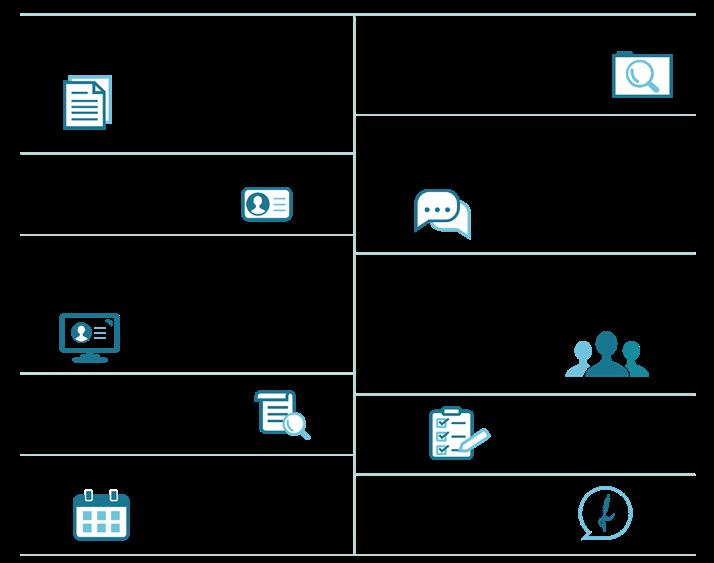
29 City of Delta 2023 Annual Report
PARKS, RECREATION & CULTURE

Objectives:
• Provide services that are consistent with Council direction
• Identify gaps in service delivery and make recommendations on previous priorities related to department services
• Encourage healthy, well-balanced lifestyles
• Provide innovative program offerings
• Encourage children and youth to develop independent and responsible skills
• Focus on introductory level opportunities
WHO WE ARE
Measuring Objectives:
• Operate and manage public facilities, programs, and services with a high standard of care to ensure the health and safety of patrons and staff is a priority
• Work collaboratively with community organizations to leverage opportunities that are in the interest of the greater community
• Maximize assets through facility optimization/ increased usage
• Identify gaps in service delivery and make recommendations on previous priorities related to department services
Parks, Recreation and Culture provides a wide variety of vibrant, inclusive, and accessible recreation, and cultural and educational opportunities that meets the needs of the community. We are committed to environmental stewardship, fiscal responsibility, and setting a standard for excellence in service delivery.
| Department Overviews
DEPARTMENTAL OBJECTIVES 30
WHAT WE DO
Parks, Recreation and Culture provides recreational activities and a wide range of instructional programs through City-operated facilities including pools, arenas, and arts, seniors, and fitness centres. The department manages over 340,000 square feet of recreational facilities, oversees Delta’s Emergency Social Services and Leisure Access Assistance programs, and coordinates the direction and operations for parks and open spaces, including sports fields, tennis and multi-purpose courts, playgrounds, community gardens, cemeteries, trails, boat launches, and more.
WHAT WE’RE PROUD OF 2023 Achievements / Outcomes
Parks, Recreation and Culture promotes awareness and interest in healthy lifestyles through participation in recreational activities and volunteer opportunities and works closely with community groups, service clubs, and notfor-profit organizations to enhance community services. The department also directly provides and or assists in the delivery of a multitude of community events throughout Delta, such as the Boundary Bay Airshow, Canada Day celebrations, Luminary Festival, as well supports Delta’s three community festivals.
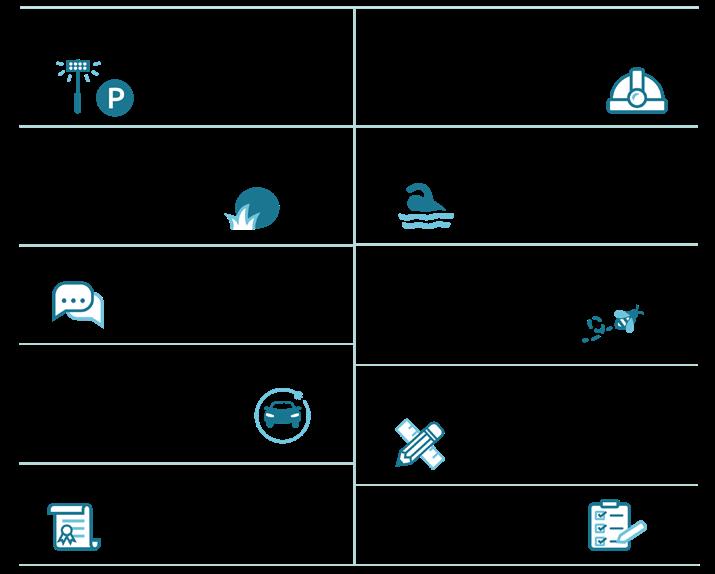
31 City of Delta 2023 Annual Report
PROPERTY USE & COMPLIANCE

DEPARTMENTAL OBJECTIVES
Objectives:
• Provide proactive and reactive response to property use compliance issues through education, public awareness, inspections, permits, licensing, and enforcement
• Provide care and adoption opportunities for impounded, surrendered, and abandoned animals at the Delta Community Animal Shelter
Measuring Objectives:
• Enforce Delta’s bylaws, both proactively and in response to calls for service
• Manage Business Licensing and Soil Deposit & Removal permits
• Manage the Delta Community Animal Shelter and provide educational opportunities related to animal welfare
| Department Overviews
32
WHO WE ARE
Property Use and Compliance is responsible for the enforcement of bylaws adopted by Mayor and Council and the operations and management of the Delta Community Animal Shelter. Other duties include the issuing and enforcing business licenses, and soil deposit and removal permits.
WHAT WE DO
Bylaw Enforcement staff initiate investigations both proactively and in response to citizen complaints related to bylaw contraventions. Bylaw Inspectors endeavor to resolve complaints through education and voluntary compliance wherever possible. The Delta Community Animal Shelter (DCAS) provides care, treatment, and adoption opportunities for hundreds of abandoned, mistreated, or surrendered animals in Delta and Tsawwassen First Nation Lands.
PROUD OF 2023 Achievements / Outcomes
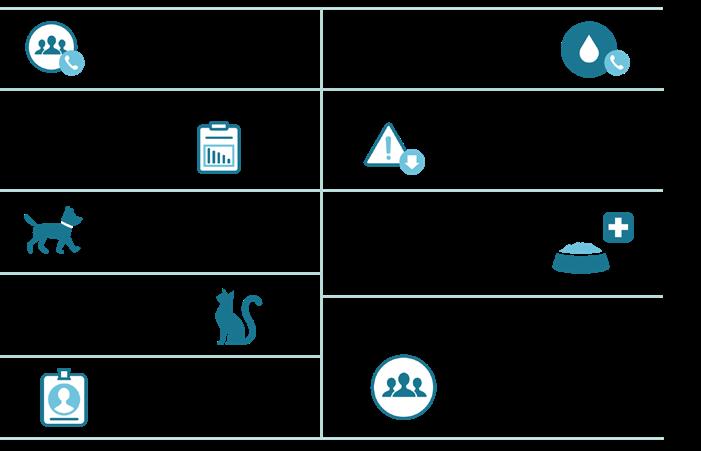
WHAT
33 City of Delta 2023 Annual Report
WE’RE
2023 AUDITED CONSOLIDATED FINANCIAL STATEMENTS
MANAGEMENT'S REPORT
Management’s Responsibility for the Consolidated Financial Statements
The consolidated financial statements have been prepared by management in accordance with Canadian public sector accounting standards (PSAB) and the integrity and objectivity of these statements are management’s responsibility. Management is also responsible for all of the notes to the consolidated financial statements and schedules, and for ensuring that this information is consistent, where appropriate, with the information contained in the consolidated financial statements.
Management is also responsible for implementing and maintaining a system of internal controls to provide reasonable assurance that reliable financial information is produced.
Mayor and Council are responsible for ensuring that management fulfills its responsibilities for financial reporting and internal control.
The external auditors, PricewaterhouseCoopers LLP, conduct an independent examination, in accordance with Canadian auditing standards, and express their opinion on the consolidated financial statements. The accompanying Independent Auditor's Report outlines their responsibilities, the scope of their examination and their opinion on these consolidated financial statements. The external auditors have full and free access to financial management of City of Delta and meet when required.

On behalf of City of Delta, Navin Chand, CPA, CMA General Manager, Finance
| Financial Statements 34

Independent auditor’s report
To the Mayor and Council of the City of Delta
Our opinion
In our opinion, the accompanying consolidated financial statements present fairly, in all material respects, the financial position of the City of Delta and its subsidiary (together, the City) as at December 31, 2023 and the results of its operations, changes in its net debt, its remeasurement gains and losses and its cash flows for the year then ended in accordance with Canadian public sector accounting standards.
What we have audited
The City’s consolidated financial statements comprise:
the consolidated statement of financial position as at December 31, 2023;
the consolidated statement of operations for the year then ended;
the consolidated statement of net financial assets for the year then ended;
the consolidated statement of cashflows for the year then ended; and
the notes to the consolidated financial statements, which include significant accounting policies and other explanatory information.
Basis for opinion
We conducted our audit in accordance with Canadian generally accepted auditing standards. Our responsibilities under those standards are further described in the Auditor’s responsibilities for the audit of the consolidated financial statements section of our report.
We believe that the audit evidence we have obtained is sufficient and appropriate to provide a basis for our opinion.
Independence
We are independent of the City in accordance with the ethical requirements that are relevant to our audit of the consolidated financial statements in Canada. We have fulfilled our other ethical responsibilities in accordance with these requirements.
Responsibilities of management and those charged with governance for the consolidated financial statements
Management is responsible for the preparation and fair presentation of the consolidated financial statements in accordance with Canadian public sector accounting standards, and for such internal control
PricewaterhouseCoopers LLP
PwC Place, 250 Howe Street, Suite 1400, Vancouver, British Columbia, Canada V6C 3S7 T.: +1 604 806 7000, F.: +1 604 806 7806, Fax to mail: ca_vancouver_main_fax@pwc.com
PwC” refers to PricewaterhouseCoopers LLP, an Ontario limited liability partnership.
35 City of Delta 2023 Annual Report

as management determines is necessary to enable the preparation of consolidated financial statements that are free from material misstatement, whether due to fraud or error.
In preparing the consolidated financial statements, management is responsible for assessing the City’s ability to continue as a going concern, disclosing, as applicable, matters related to going concern and using the going concern basis of accounting unless management either intends to liquidate the City or to cease operations, or has no realistic alternative but to do so.
Those charged with governance are responsible for overseeing the City’s financial reporting process.
Auditor’s responsibilities for the audit of the consolidated financial statements
Our objectives are to obtain reasonable assurance about whether the consolidated financial statements as a whole are free from material misstatement, whether due to fraud or error, and to issue an auditor’s report that includes our opinion. Reasonable assurance is a high level of assurance, but is not a guarantee that an audit conducted in accordance with Canadian generally accepted auditing standards will always detect a material misstatement when it exists. Misstatements can arise from fraud or error and are considered material if, individually or in the aggregate, they could reasonably be expected to influence the economic decisions of users taken on the basis of these consolidated financial statements.
As part of an audit in accordance with Canadian generally accepted auditing standards, we exercise professional judgment and maintain professional skepticism throughout the audit. We also:
Identify and assess the risks of material misstatement of the consolidated financial statements, whether due to fraud or error, design and perform audit procedures responsive to those risks, and obtain audit evidence that is sufficient and appropriate to provide a basis for our opinion. The risk of not detecting a material misstatement resulting from fraud is higher than for one resulting from error, as fraud may involve collusion, forgery, intentional omissions, misrepresentations, or the override of internal control.
Obtain an understanding of internal control relevant to the audit in order to design audit procedures that are appropriate in the circumstances, but not for the purpose of expressing an opinion on the effectiveness of the City’s internal control.
Evaluate the appropriateness of accounting policies used and the reasonableness of accounting estimates and related disclosures made by management.
Conclude on the appropriateness of management’s use of the going concern basis of accounting and, based on the audit evidence obtained, whether a material uncertainty exists related to events or conditions that may cast significant doubt on the City’s ability to continue as a going concern. If we conclude that a material uncertainty exists, we are required to draw attention in our auditor’s report to the related disclosures in the consolidated financial statements or, if such disclosures are inadequate, to modify our opinion. Our conclusions are based on the audit evidence obtained up to the date of our auditor’s report. However, future events or conditions may cause the City to cease to continue as a going concern.
| Financial Statements 36

Evaluate the overall presentation, structure and content of the consolidated financial statements, including the disclosures, and whether the consolidated financial statements represent the underlying transactions and events in a manner that achieves fair presentation.
Obtain sufficient appropriate audit evidence regarding the financial information of the entities or business activities within the City to express an opinion on the consolidated financial statements. We are responsible for the direction, supervision and performance of the group audit. We remain solely responsible for our audit opinion.
We communicate with those charged with governance regarding, among other matters, the planned scope and timing of the audit and significant audit findings, including any significant deficiencies in internal control that we identify during our audit.
Chartered Professional Accountants
Vancouver, British Columbia May 6, 2024
37 City of Delta 2023 Annual Report
Consolidated Statement of Financial Position
As at December 31, 2023 with comparative figures for 2022
 Navin Chand, General Manager, Finance
Navin Chand, General Manager, Finance
| Financial Statements 38
As at December 31 2023 2022 (restated) Financial Assets Cash and cash equivalents (note 2) $ 172,439,168 $ 59,633,402 Restricted cash and cash equivalents (note 3) 37,781,835 34,263,721 Accounts receivable (note 4) 30,635,371 30,751,470 Portfolio investments (note 5) 138,715,598 219,017,977 379,571,972 343,666,570 Liabilities Accounts payable (note 6) 29,547,531 28,482,861 Other liabilities (note 7) 29,606,095 29,661,676 Accrued employee future benefits (note 8) 9,769,700 9,573,800 Deferred revenues (note 9) 10,560,727 7,663,987 Restricted revenues (note 10) 47,397,110 46,479,036 Refundable performance deposits (note 11) 37,781,835 34,263,721 164,662,998 156,125,081 Net Financial Assets 214,908,974 187,541,489 Non Financial Assets Tangible capital assets (note 14) 1,012,806,991 991,497,319 Inventories 1,028,710 1,039,178 Prepaids 1,300,392 1,274,931 Other assets (note 12) 1,326,507 1,256,906 Accumulated Surplus (note 15) $ 1,231,371,574 $
Commitments
1,182,609,823
and contingencies (note 16)
Consolidated Statement of Operations
Year ended December 31, 2023 with comparative figures for 2022
Revenues
39 City of Delta 2023 Annual Report
For the years ended December 31 2023 Budget 2023 2022 (restated)
Taxation
$ 181,402,000 $ 182,971,054 $ 171,732,727 Government transfers
3,163,000 20,939,754 7,606,330 Sale of services (schedule
85,968,500 84,845,399 83,532,547 Licenses, permits, fees and penalties (schedule
8,875,000 11,194,021 10,050,868 Contributions (schedule
2,065,500 6,466,379 5,445,791 Investment income 5,873,500 14,692,087 6,629,647 Actuarial earnings on debt - - 189,334 Development cost charges
3,215,500 1,110,500
Landfill royalties 3,730,000 4,443,283 4,080,853 Contributed tangible capital assets (note 14) 21,448,000 4,438,593 957,746 MFA Surplus Distribution - - 79,823 Other (schedule
5,226,500 8,222,309 2,912,914 320,967,500 339,323,379 296,304,080 Expenses General government 32,580,500 32,365,393 30,302,439 Library services 4,216,000 4,214,807 4,083,720 Fire services 39,603,500 41,353,317 37,063,228 Police services 54,564,000 55,476,806 51,082,613 Other protective services 3,628,000 3,547,392 3,397,475 Water services 31,197,000 30,773,389 27,690,701 Sewer services 19,080,000 19,402,699 16,453,348 Engineering 13,032,000 13,144,631 12,178,774 Drainage 8,135,500 8,707,012 8,963,313 Road and traffic safety 20,393,500 21,347,626 20,599,900 Environmental health 1,020,500 876,061 974,737 Solid waste 9,122,500 8,177,592 7,594,231 Community planning and development 8,220,500 7,600,775 6,884,216 Parks, recreation and culture 43,267,000 42,745,888 40,229,228 Loss on disposal of tangible capital assets - 828,240 1,261,777 288,060,500 290,561,628 268,759,700 Annual Surplus 32,907,000 48,761,751 27,544,380 Accumulated Surplus, beginning of year 1,182,609,823 1,182,609,823 1,155,065,443 Accumulated Surplus, end of year $ 1,215,516,823 $ 1,231,371,574 $ 1,182,609,823
and grants in lieu (note 13)
(schedule 1)
2)
3)
4)
(note 10)
3,085,500
5)
Consolidated Statement of Net Financial Assets
Year ended December 31, 2023 with comparative figures for 2022
| Financial Statements 40
For the years ended December 31 2023 Budget 2023 2022 (restated) Annual Surplus $ 32,907,000 $ 48,761,751 $ 27,544,380 Amortization
tangible capital assets
14) 29,000,000 30,319,288 29,080,097 Acquisition of contributed tangible capital assets (note 14) (21,448,000) (4,438,593) (957,746) Acquisition of tangible capital assets (106,316,500) (48,568,928) (53,478,900) Loss on disposal of tangible capital assets - 828,240 1,261,777 Proceeds from disposal of tangible capital assets - 550,321 253,253 Changes in inventories - 10,467 (101,901) Changes in prepaid - (25,460) (127,675) Changes in other assets - (69,601) (55,265) Increase (Decrease) in Net Financial Assets (65,857,500) 27,367,485
Net Financial Assets, beginning of year 187,541,489 187,541,489 184,123,469 Net Financial Assets, end of year $ 121,683,989 $ 214,908,974 $ 187,541,489
of
(note
3,418,020
Consolidated Statement of Cashflows
Year ended December 31, 2023 with comparative figures for 2022
Transactions
41 City of Delta 2023 Annual Report
For the years ended December 31 Cash provided by (used in): 2023 2022 Operating Transactions Annual Surplus $ 48,761,751 $ 27,544,380 Non-cash charges to operations Amortization of tangible capital assets (note 14) 30,319,288 29,080,097 Contribution of tangible capital assets (note 14) (4,438,593) (957,746) Loss on disposal of tangible capital assets 828,240 1,261,777 26,708,935 29,384,128 Changes in non-cash working capital Accounts receivable 116,100 (8,225,984) Accounts payable 1,064,670 4,397,489 Other liabilities (55,581) 885,013 Accrued employee future benefits 195,900 121,100 Prepaids, inventories and other assets (84,594) (284,841) Restricted revenues (1,840,725) (559,559) Restricted cash and cash equivalents (3,518,114) (1,624,023) Refundable performance deposits 3,518,114 1,624,023 Deferred development cost charges used (1,110,500) (3,085,500) Deferred revenues 2,896,739 (88,079) 1,182,009 (6,840,361) Net change in cash from operating transactions 76,652,695 50,088,147 Capital Transactions Acquisition of tangible capital assets (48,568,928) (53,478,900) Proceeds from disposal of tangible capital assets 550,321 253,253 Cash used in capital transactions (48,018,607) (53,225,647) Investing Transactions Proceeds from sale of portfolio investments 199,474,324 313,028,717 Purchase of portfolio investments (119,171,945) (334,257,165) Cash provided (used) in investing transactions 80,302,379 (21,228,448) Financing
Long term debt retired - (313,328) Deferred development cost charges interest earned 2,041,024 1,045,677 Deferred development cost charges collected 1,828,275 896,596 Cash provided by financing transactions 3,869,299 1,628,945 Increase (Decrease) in Cash and Cash Equivalents 112,805,766 (22,737,003) Cash and Cash Equivalents, beginning of year 59,633,402 82,370,405 Cash and Cash Equivalents, end of year $ 172,439,168 $ 59,633,402 Supplemental cash flow information, interest paid $ - $ 13,325
Notes to the Consolidated Financial Statements
Year ended December 31, 2023 with comparative figures for 2022
1. Significant Accounting Policies
These consolidated financial statements have been prepared by management in accordance with Canadian public sector accounting standards using standards established by the Public Sector Accounting Board ("PSAB") of the Chartered Professional Accountants of Canada. The significant accounting policies are summarized as follows:
a)
Basis of Consolidation
The consolidated financial statements of the City of Delta (the "City") reflect a combination of the City's general revenue, water, sewer, solid waste and reserve funds. The equity in Ladner Harbour Authority is included in the assets of the City and all interfund transactions, fund balances and activities have been eliminated.
b)
Basis of Accounting
The consolidated financial statements are prepared using the accrual basis of accounting. The accrual basis of accounting records revenue as it is earned and measurable. Expenses are recognized as they are incurred and measurable based upon receipt of goods or services and/or the creation of a legal obligation to pay.
c) Government Transfers
Government transfers, which include legislative grants, are recognized as revenue in the consolidated financial statements when the transfer is authorized and any eligibility criteria are met, except to the extent that transfer stipulations give rise to an obligation that meets the definition of a liability. Transfers are recognized as deferred revenue when transfer stipulations give rise to a liability. Transfer revenue is recognized in the consolidated statement of operations as the stipulation liabilities are settled.
d)
Cash and Cash Equivalents
Cash and cash equivalents include fixed return financial instruments maturing within 90 days of purchase. They are highly liquid investments that are readily convertible to known amounts of cash and which are subject to an insignificant risk of change in value. Cash and cash equivalents do not include any of the City’s administered Trust Funds.
e)
Portfolio Investments
Investments are recorded at cost, adjusted for amortization of premiums or discounts. Provision for losses are recorded when they are considered to be other than temporary. At various times during the term of each individual investment, market value may be less than cost. Such declines in value are considered temporary for investments with known maturity dates as they generally reverse as the investments mature and therefore an adjustment to market value for these market declines is not recorded. These investments do not include any of the City’s administered Trust Funds.
The City has investments in guarantee investment certificates "GIC's", term deposits and bonds that have a maturity of greater than three months at the time of acquisition. GIC’s, term deposits, bonds and other investments not quoted in an active market are reported at cost or amortized cost. Detailed information regarding portfolio investments is disclosed in Note 5.
Portfolio investments in foreign currencies are recorded at the current exchange rate as at the year end. The change in the fair value as at year end is recognized in the consolidated statement of operations for that year.
Impairment is defined as a loss in value of a portfolio investment that is other than a temporary decline and is included in the consolidated statement of operations.
f)
Accounts Receivable
Accounts receivable are net of an allowance for doubtful accounts and therefore represent amounts expected to be collected within the next year.
g) Development Cost Charges
Development cost charges are restricted by legislation to expenditures on capital infrastructure. These amounts are deferred upon receipt and recognized as revenue when the expenditures are incurred in accordance with the Section 188 of the Community Charter and Section 569 of the Local Government Act
| Financial Statements 42
Notes to the Consolidated Financial Statements
Year ended December 31, 2023 with comparative figures for 2022
h) Non-Financial Assets
Non-financial assets are not available to discharge existing liabilities and are held for use in the provision of services. They have useful lives extending beyond the current year and are not intended for sale in the ordinary course of operations. The change in non-financial assets during the year, together with the annual surplus, provides the consolidated change in net financial assets for the year.
i) Tangible Capital Assets
Tangible capital assets are recorded at cost which includes all amounts that are directly attributable to the acquisition, construction, development or betterment of the asset. The cost, less residual value, of the tangible capital assets is amortized on a straight-line basis over their estimated useful lives as follows:
Buildings
10 to 45 years
Vehicles 3 to 15 years
Pooled Assets
3 to 30 years
Machinery and Equipment 10 years
Land Improvements
Water Infrastructure
Sewer Infrastructure
Drainage Infrastructure
Roads Infrastructure
15 to 35 years
30 to 75 years
30 to 100 years
30 to 150 years
15 to 60 years
Tangible capital assets received as contributions are recorded at their fair value at the date of receipt and also recorded as revenue. Natural resources are not recognized as assets in the consolidated financial statements. Assets under construction are not amortized.
j) Inventory
Inventory is recorded at cost, net of allowances for obsolete stock. Cost is determined on a weighted average basis.
k) Deferred Revenue
Receipts which are restricted by legislation of senior governments or by agreement with external parties are deferred and reported as deferred revenues. The amounts will be recognized as revenue in the year in which the expenditures are incurred. The City defers a portion of permits, licenses and other fees and recognizes this revenue in the year in which related services are performed or other related expenditures are incurred. (Note 9).
l) Revenue Recognition
Revenue is recorded on the accrual basis and is recognized when earned. Revenue unearned in the current period is reported on the consolidated statement of financial position as deferred revenue or restricted revenue.
Taxes are recorded at estimated amounts when they meet the definition of an asset, have been authorized and when the taxable event occurs. Annual levies for non-optional municipal services and general administrative services are recorded as taxes for municipal services in the year they are levied. Taxes receivable are recognized net of an allowance for anticipated uncollectable amounts. Levies imposed by other taxing authorities are not included as taxes for municipal purposes. Through the British Columbia Assessment's appeal process, taxes may be adjusted by way of supplementary roll adjustments. The effects of these adjustments on taxes are recognized at the time they are awarded to the extent such adjustments exceed amounts already provided for.
Charges for garbage, recycling, water and sewer are recorded as sale of services.
A gain or loss on the disposal of tangible capital assets is recorded when the City disposes or replaces tangible capital assets. The proceeds collected are offset by the net book value at the time of disposition. Contributed assets are recorded at fair value at the time of transfer of ownership to the City.
Investment income is recorded on an accrual basis and recognized as earned.
Contributed tangible capital assets are assets contributed by developers as a requirement to provide subdivision infrastructure for streets, lighting, sidewalks, sewer, water and drainage. Upon completion, these works are turned over to the City. Tangible capital assets are recorded at their fair value at the date of receipt and are also recorded as revenue.
43 City of Delta 2023 Annual Report
Notes to the Consolidated Financial Statements
Year ended December 31, 2023 with comparative figures for 2022
m) Use of Estimates
The preparation of consolidated financial statements in accordance with Canadian public sector accounting standards requires management to make estimates and assumptions. These affect the reported amounts of assets and liabilities and disclosure of contingent assets and liabilities at the date of the consolidated financial statements, and the reported amounts of revenue and expenses during the reporting period. Significant areas requiring the use of management estimates relate to the determination of accrued sick benefits and retirement liabilities, collectability of accounts receivable, useful lives of tangible capital assets and provisions for contingencies. The amounts recorded for tangible capital assets are based on management's estimate for historical cost, useful lives and valuation for contributed assets. Actual results could differ from those estimates. Adjustments, if any, will be reflected in operations in the period of settlement. The consolidated financial statements have, in management’s opinion, been prepared within the framework of the above-mentioned accounting principles.
n) Basis of Segmentation (Notes 17 and 18)
City services have been segmented by grouping services that have similar service objectives (by function). Revenues that are directly related to the costs of the function have been attributed to each segment. Interest is allocated based on the purpose of the specific borrowing.
o) Employee Future Benefits (Notes 8 and 16)
The City and its employees make contributions to the Municipal Pension Plan and the employees accrue benefits under this plan based on service. The City's contributions are expensed as incurred.
Post-employment benefits are also accrued by City employees. Liabilities related to these benefits are actuarially determined based on service and best estimates of retirement ages and expected future salary and wage increases. Liabilities under these benefit plans are accrued and based on projected benefits as the employees render services necessary to earn future benefits.
p) Contaminated Sites
Contaminated sites are formed as a result of contamination being introduced into air, soil, water or sediment of a chemical, organic or radioactive material or live organism that exceeds an environmental standard. The liability is recorded net of any expected recoveries. A liability for remediation of contaminated sites is recognized when a site is not in productive use and all the following criteria are met:
1) An environmental standard exists;
2) Contamination exceeds the environmental standard;
3) The municipality is directly responsible or accepts responsibility;
4) It is expected that the future economic benefits will be given up;
5) A reasonable estimate of the amount can be made.
Management has assessed its potential liabilities under the standard including sites that are no longer in productive use and sites for which the City accepts responsibility. There were no such sites that had contamination in excess of an environmental standard which required remediation at this time; therefore no liability was recognized at December 31, 2023.
q) Budget Figures (Note 19)
The operating and capital budget figures, presented on a basis consistent with that used for actual results, were approved by Council as the 2023 - 2027 Financial Plan Bylaw No. 8195, 2022 adopted December 12, 2022. Adjustments to the budgeted amounts are required to comply with Canadian public sector accounting standards for inclusion in the consolidated statement of operations and the consolidated statement of net financial assets.
r) Asset Retirement Obligation (Note 7 & 21)
Effective January 1, 2023, the City adopted PS 3280 Asset Retirement Obligations using the modified retroactive approach resulting in the comparative periods being restated. PS 3280 defines and establishes standards for recognition, measurement, presentation and disclosure of key legal obligations associated with the retirement of tangible capital assets. The City has completed an assessment of obligations within the scope of PS 3280. Its asset retirement activities include primarily the abatement of hazardous materials in buildings. The asset retirement obligation at the financial statement date is measured based on the City’s estimate of the amount required to retire its tangible capital assets at the statement of financial position date.
| Financial Statements 44
Notes to the Consolidated Financial Statements
Year ended December 31, 2023 with comparative figures for 2022
s) Risk Management
The City is exposed to various risks related to its financial instruments. It is management's opinion that the City is not exposed to significant market, liquidity or credit risk arising from these financial instruments.
The City's risk management objective when it invests in financial instruments is to ensure that any investments are in quality securities, so as to safely guard the assets, and enable the City to continue operations as a going concern.
Market Risk - Market risk is the risk that changes in market prices, such as foreign exchange rates and interest rates, will affect The City's income or the value of its financial instruments. The City's exposure to currency risk is related only to the value of foreign exchange transactions in the normal course of business, and the City manages this risk by minimizing the amount of transactions in foreign funds.
Interest Rate Risk - The City is not subject to interest rate risk as the City has no long-term debt.
Liquidity Risk - Liquidity risk is the risk that the City will have difficulty in meeting its financial obligations when they come due. The City manages liquidity risk by continually monitoring cash flows and through the receipt of grants and borrowed funds.
All financial liabilities are current and expected to mature within one year.
Credit Risk - Credit risk is the risk of financial loss to the City if a customer or counterparty to a financial instrument fails to meet its contractual obligations.
The City's exposure to credit risk is related only to the value of accounts receivable in its normal course of business, and the City manages this risk by minimizing the amount of transactions that require recovery. The City continually monitors and manages the collection of receivables, while adding provisions where collection of balances is less likely.
t) Financial Instruments
The City’s financial instruments consist of cash and cash equivalents, restricted cash and cash equivalents, accounts receivable, portfolio investments, and accounts payable and other liabilities. All financial instruments are carried at cost or amortized cost in the financial statements. All financial assets are assessed annually for impairment. When financial assets are impaired, impairment losses are recorded in the statement of operations.
u) New Accounting Standards Adopted
Effective January 1, 2023, the City adopted below accounting standards issued by the Public Sector Accounting Board,
- PS 3280 – Asset Retirement Obligations
- PS 3450 – Financial instruments
- PS 1201 – Financial Statements Presentation
- PS 2601 – Foreign Currency Translation
- PS 3401 – Portfolio Investments
45 City of Delta 2023 Annual Report
Notes to the Consolidated Financial Statements
Year ended December 31, 2023 with comparative figures for 2022
2. Cash and Cash Equivalents
Cash and cash equivalents as at December 31, 2023 is comprised of Canadian dollar accounts and one US dollar credit union account, chartered bank high interest savings accounts and short term deposits. The accounts are interest bearing and term deposits mature within 90 days of purchase.
3. Restricted Cash and Cash Equivalents
(effective interest 5.29 to 5.70%)
Restricted cash comprises cash and cash equivalents that mature within 90 days of purchase and is held in accordance with third party development and other agreements. The cash is not available for general use.
4. Accounts Receivable
5. Portfolio Investments
Portfolio Investments as at December 31 comprise:
219,017,977
Portfolio investments include provincial backed bonds and notes; chartered bank bonds, notes, banker's acceptances and strip coupons, guaranteed investment certificates (GIC's) and Credit Union term deposits. The effective interest rates range from 1.26% to 6.21% (2022 - .8% to 5.15%). In 2023, the average rate of return was 4.5% (2022 - 2.34%). The maturity dates of the investments range from January 2024 to 2028.
| Financial Statements 46
2023 2022 Canadian dollar accounts
interest rate
$ 114,316,679 $ 39,043,292 Chartered banks and credit union term deposits (effective interest 5.15%
5.21%) 56,646,648 18,942,509 US dollar account 1,475,841 1,647,601 $ 172,439,168 $ 59,633,402
(effective
5.29% to 5.70%)
to
2023 2022 Chartered
$ 37,781,835 $ 34,263,721
banks, credit unions
2023 2022 Taxes $ 5,796,523 $ 4,343,344 Utilities 8,056,763 7,765,800 Local improvements (interest bearing prime + 1%; repayment term - 15 years) 193,207 213,118 Trade 17,152,479 18,512,284 31,198,972 30,834,546 Less: allowance for doubtful accounts (563,601) (83,076) $ 30,635,371 $ 30,751,470
2023 2022 Chartered
interest rate
maturing 2024
$ 113,785,764 $ 182,035,447 Provincial government bonds
interest rate
maturing
11,596,330 13,159,201 Federal government bonds - 14,710,260 Credit unions term
13,333,504
$ 138,715,598 $
banks (effective
1.26% to 6.21%,
to 2028)
(effective
2.15% to 4.54%,
2024 to 2028)
deposits (effective interest rate 2% to 6.4%, maturing 2024-2026)
9,113,069
Notes to the Consolidated Financial Statements
Year ended December 31, 2023 with comparative figures for 2022
6. Accounts Payable
7. Other Liabilities
8. Employee Benefit Plans
Actuarial assumptions used to determine the City's accrued benefit obligation are as follows:
The City provides employee future benefits in the form of severance benefits, compensated absences and non-vested sick leave to qualifying employees. Severance benefits are cash settlements to employees who cease employment with the City after a specified period of time. The City provides certain post-employment termination benefits to both qualifying union and exempt employees. An actuarial valuation of these benefits was performed to determine the City's liability and accrued benefit obligation as at December 31, 2022. The next valuation will be performed as at December 31, 2024.
47 City of Delta 2023 Annual Report
2023 2022 Trade $ 24,072,761 $ 22,955,411 Holdback 1,689,360 1,843,173 Other government 3,785,410 3,684,277 $ 29,547,531 $ 28,482,861
2023 2022 Wages and benefits $ 2,380,809 $ 3,496,756 Accrued benefits 9,708,676 8,959,102 Legal liabilities 602,000 770,517 Prepaid utilities 1,245,447 1,209,557 Prepaid taxes 12,328,543 12,237,489 Other 409,164 56,110 Asset Retirement Obligation 2,933,179 2,933,179 Due (from) to cemeteries (1,723) (1,034) $ 29,606,095 $ 29,661,676
2023 2022 Accrued benefit liability, beginning of year $ 9,573,800 $ 9,452,700 Service cost 945,100 830,900 Interest cost 439,400 271,700 Benefit payments (1,234,700) (977,100) Amortization of actuarial loss (gain) 46,100 (4,400) Accrued benefit liability, end of year $ 9,769,700 $ 9,573,800 Unamortized net actuarial loss (gain) 290,300 336,400 Accrued benefit obligation, end of year $ 10,060,000 $ 9,910,200
2023 2022 Discount rates 3%-4.5% 3%-4.5% Expected compensation increases 3%-9.5% 3%-9.5% Estimated average remaining service life of employees 13
13
Notes to the Consolidated Financial Statements
Year ended December 31, 2023 with comparative figures for 2022
9. Deferred Revenues
Deferred revenue represents funds that are: 1) are collected but not earned as of December 31, 2023. 2) are funds received from external parties for specified purposes. These funds are recognized as revenue in the period when the eligible related expenditures or restrictions have been met. Local improvements are geographically localized projects that are interim financed by the City. The costs are recovered from the benefiting property owners and the terms are established at the onset of the process.
10. Restricted Revenues
DCC’s are collected to pay for general capital and utility expenditures due to development. In accordance with the Community Charter, these funds must be deposited into a separate reserve fund. In accordance with PSAB recommendations, the City records DCC’s levied as deferred revenues. When the related expenditures are incurred, the DCC’s are then recognized as revenue.
Boundary Bay Airport Maintenance Account comprises funds received pursuant to the partial lease surrender agreement between Alpha Aviation and the City dated September 17, 2012. The funds are restricted to airport improvements as mutually agreed upon by both parties. The funds were fully expended as at December 31, 2023.
| Financial Statements 48
2023 2022 Local improvements $ 193,207 $ 213,118 Government transfers 4,660,134 3,662,658 Prepaid recreational fees 1,429,242 1,113,106 Prepaid business licenses 991,041 991,018 Deferred development fees 652,027 1,189,013 Other 2,635,076 495,074 $ 10,560,727 $ 7,663,987
2023 2022 Deferred development cost charges "DCC" $ 47,397,110 $ 44,638,311 Boundary Bay Airport maintenance account - 1,840,725 $ 47,397,110 $ 46,479,036 DCC's for capital costs related to: 2023 2022 Drainage $ 5,080,721 $ 5,213,770 Roads 19,421,774 17,865,854 Open Space 14,420,182 13,405,386 Water 4,391,399 4,077,230 Sewer 4,083,034 4,076,071 $ 47,397,110 $ 44,638,311 2023 2022 Deferred DCC's, beginning of the year $ 44,638,311 $ 45,781,538 Transfers to revenue (1,110,500) (3,085,500) DCC's levied for the year 1,828,275 896,596 Interest allocated 2,041,024 1,045,677 Deferred DCC's, end of the year $ 47,397,110 $ 44,638,311
Notes to the Consolidated Financial Statements
Year ended December 31, 2023 with comparative figures for 2022
11. Refundable Performance Deposits
The City holds cash deposits received from depositors as security to ensure the satisfactory completion of works and other obligations. These deposits are refundable upon meeting the terms and conditions outlined in the respective agreements or contracts.
12. Other Assets
13. Taxation Revenue
49 City of Delta 2023 Annual Report
2023 2022 Land held for resale (tax sale) $ 16,374 $Ladner Harbour Infrastructure 1,310,133 1,256,906 $ 1,326,507 $ 1,256,906
2023 2022 General taxation $ 170,677,030 $ 159,950,654 Tsawwassen Business Improvement Association 150,363 143,696 Drainage and irrigation levy 5,613,575 5,430,141 Other government payments in lieu 591,076 571,920 Special assessments 36,320 178,067 TFN Services Levy 351,558 338,287 Utility companies payment in lieu 2,398,905 1,988,751 Utility companies special assessments 2,300,438 2,137,624 Vancouver Ports Authority 851,789 993,588 Collections for other taxing authorities 135,111,377 116,547,503 Subtotal 318,082,431 288,280,231 Transfer to: Province of BC - school taxes (104,128,623) (89,244,456) Greater Vancouver Regional District (4,920,147) (4,115,384) Municipal Finance Authority (19,350) (15,979) BC Assessment Authority (3,541,760) (3,076,304) Greater Vancouver Transportation Authority (22,501,498) (20,095,380) Total collections for other taxing authorities (135,111,378) (116,547,503) General taxation and debt levy $ 182,971,054 $ 171,732,727
Notes to the Consolidated Financial Statements
Year ended December 31, 2023 with comparative figures for 2022
14. Tangible Capital Assets
a) Assets under construction (Work in Progress) having a value of $20,785,842 (2022 -$13,030,957) have not been amortized. Amortization of these assets will commence when the assets are put into service.
b) There have been no write-downs of tangible capital assets during the year.
c) Contributed assets have been recognized at fair market value at the date of contribution.
| Financial Statements 50
Balance (restated) Dec 31, 2022 Additions Disposals Balance Dec 31, 2023 Cost Buildings $ 180,248,279 $ 4,433,122 $ 409,395 $ 184,272,006 Drainage infrastructure 275,302,809 3,178,636 101,622 278,379,823 Land 238,821,910 - 478 238,821,432 Land improvements 36,271,701 3,243,577 1,794,135 37,721,143 Leased assets 6,722,525 - - 6,722,525 Machinery and equipment 12,996,435 927,625 320,358 13,603,702 Pooled assets 54,944,578 4,704,564 2,954,342 56,694,800 Roads infrastructure 365,829,718 15,766,792 2,667,345 378,929,165 Sewer mains 142,323,766 2,784,055 21,123 145,086,698 Vehicles 32,405,304 3,256,916 1,894,195 33,768,025 Waterworks 158,995,751 6,515,775 323,898 165,187,628 Work in progress 13,030,957 8,196,459 441,574 20,785,842 Total Cost $ 1,517,893,733 $ 53,007,521 $ 10,928,465 $ 1,559,972,789 Accumulated Amortization Buildings $ 67,226,926 $ 5,856,443 $ 366,061 $ 72,717,308 Drainage infrastructure 94,724,610 3,641,678 73,476 98,292,812 Land improvements 16,450,544 1,416,669 1,794,135 16,073,078 Leased assets 569,085 370,868 - 939,953 Machinery and equipment 8,024,954 833,152 315,171 8,542,935 Pooled assets 20,565,005 3,990,278 2,954,342 21,600,941 Roads infrastructure 190,325,536 7,854,535 1,920,456 196,259,615 Sewer mains 55,516,816 1,964,871 10,665 57,471,022 Vehicles 20,646,939 2,178,603 1,861,335 20,964,207 Waterworks 52,345,999 2,212,191 254,263 54,303,927 Total Accumulated Amortization $ 526,396,414 $ 30,319,288 $ 9,549,904 $ 547,165,798 Net Book Value Buildings $ 113,021,353 $ (1,423,321) $ 43,334 $ 111,554,698 Drainage infrastructure 180,578,199 (463,042) 28,146 180,087,011 Land 238,821,910 - 478 238,821,432 Land improvements 19,821,157 1,826,908 - 21,648,065 Leased assets 6,153,440 (370,868) - 5,782,572 Machinery and equipment 4,971,481 94,473 5,187 5,060,767 Pooled assets 34,379,573 714,286 - 35,093,859 Roads infrastructure 175,504,182 7,912,257 746,889 182,669,550 Sewer mains 86,806,950 819,184 10,458 87,615,676 Vehicles 11,758,365 1,078,313 32,860 12,803,818 Waterworks 106,649,752 4,303,584 69,635 110,883,701 Work in progress 13,030,957 8,196,459 441,574 20,785,842 Total Net Book Value $ 991,497,319 $ 22,688,233 $ 1,378,561 $ 1,012,806,991
Notes to the Consolidated Financial Statements
Year ended December 31, 2023 with comparative figures for 2022
14. Tangible Capital Assets (continued):
15. Accumulated Surplus
51 City of Delta 2023 Annual Report
The value of the Contributed Assets received is as follows: 2023 2022 Land Improvements $ 522,505 $Pooled assets 111,995Drainage 260,635Roads 1,406,270Water 1,377,498 824,746 Sewer 759,690 133,000 $ 4,438,593 $ 957,746
2023 2022 (restated) Equity in Tangible Capital Assets $ 1,012,806,991 $ 991,497,319 General 33,461,837 31,841,656 Water 13,605,846 11,935,107 Sewer 8,220,394 8,754,969 Solid waste 6,767,172 5,724,718 Total Unappropriated Surplus 62,055,249 58,256,450 Capital projects 4,707,936 4,505,202 Community Amenity 438,992 230,265 Equipment replacement 15,739,980 15,409,261 Growing Communities Fund 15,910,100Ladner parking 450,723 403,134 Operating 341,069 240,257 Parks and public lands 7,449,084 6,377,615 Tax sale 154,320 147,675 Total Statutory Reserves 45,192,204 27,313,409 Casino 2,387,297 551,871 Designated capital (work in progress) 55,822,938 52,746,067 Development 3,612,643 3,612,643 Drainage and irrigation 3,732,953 3,783,381 Emergency 1,000,000 1,000,000 Environment 4,107,116 2,591,139 Insurance 3,520,000 3,520,000 Landfill 628,108 628,108 Landscaping 2,499,344 1,957,936 Other 4,663,270 4,209,135 Payroll benefits and allowances 2,882,362 2,882,362 Recreation 4,220,332 4,876,881 Recycling and solid waste 716,220 716,220 Road restoration 6,534,398 5,862,677 Sewer 7,812,341 9,420,758 Water 7,177,808 7,183,467 Total Non-Statutory Reserves 111,317,130 105,542,645 Total Reserves (Schedule 7) 156,509,334 132,856,054 Total Accumulated Surplus $ 1,231,371,574 $ 1,182,609,823
Notes to the Consolidated Financial Statements
Year ended December 31, 2023 with comparative figures for 2022
16. Commitments and Contingencies
a) The City, as a member of the Greater Vancouver Water District, the Greater Vancouver Sewage and Drainage District, and the Greater Vancouver Regional District, is jointly and severally liable for the net capital liabilities of these districts.
b) The City of Delta and its employees contribute to the Municipal Pension Plan (a jointly trusteed pension plan). The board of trustees, representing plan members and employers, is responsible for administering the plan, including investment of assets and administration of benefits. The plan is a multi-employer defined benefit pension plan. Basic pension benefits are based on a formula. As at December 31, 2022, the plan has about 240,000 active members and approximately 124,000 retired members. Active members include approximately 43,000 contributors from local governments.
Every three years, an actuarial valuation is performed to assess the financial position of the plan and adequacy of plan funding. The actuary determines an appropriate combined employer and member contribution rate to fund the plan. The actuary’s calculated contribution rate is based on the entry-age normal cost method, which produces the long-term rate of member and employer contributions sufficient to provide benefits for average future entrants to the plan. This rate may be adjusted for the amortization of any actuarial funding surplus and will be adjusted for the amortization of any unfunded actuarial liability.
The most recent valuation for the Municipal Pension Plan as at December 31, 2021, indicated a $3,761 million funding surplus for basic pension benefits on a going concern basis.
The City of Delta paid $13,581,455 (2022-$12,736,864) for employer contributions while employees contributed $11,363,026 (2022$10,590,662) to the plan in fiscal year 2023.
The next valuation will be as at December 31, 2024.
Employers participating in the plan record their pension expense as the amount of employer contributions made during the fiscal year (defined contribution pension plan accounting). This is because the plan records accrued liabilities and accrued assets for the plan in aggregate, resulting in no consistent and reliable basis for allocating the obligation, assets and cost to individual employers participating in the plan.
c) The City insures itself through a combination of insurance policies and self-insurance. The City has a funded self-appropriation insurance reserve (note 15 and schedule 7). Based on estimates, this appropriation reasonably provides for all outstanding claims.
| Financial Statements 52
Notes to the Consolidated Financial Statements
Year ended December 31, 2023 with comparative figures for 2022
17. Basis of Segmented Reporting
The City has adopted the Public Sector Accounting Board recommendation requiring financial information to be provided on a segmented basis. Municipal services have been segmented by grouping activities that have similar service objectives (by function). Revenues that are directly related to the cost of the function have been attributed to each segment. Expenditures reported for each segment include an allocation of internal equipment charges based on departmental usage of equipment. Interest is allocated to functions based on the purpose of the specific borrowing.
City Services are provided by departments and have been separately disclosed as follows:
Administration and Fiscal
General Government includes the Clerks Office, the Office of the City Manager, Human Resources and Corporate Planning, Legal Services and all other legislative services. The Departments within the General Government are responsible for adopting bylaws; and administrative policy; Fiscal also includes the levy for taxation, and library services as well as corporate wide services.
Finance
Finance is responsible for the overall financial management of the City including the levying and collecting taxes; managing City assets; procurement, audit services and support of the City's information technology.
Police
The Police Department is responsible for the safety of lives and property of citizens, to preserve peace and order, to prevent crimes from occurring, to detect offenders, and to enforce the law.
Fire
The Fire Department is responsible for fire suppression, fire prevention programs, training and education related to prevention.
Other Protective Services
Other Protective Services is responsible for bylaw enforcement and animal control.
Engineering, Public Works and Transportation
The Engineering Department is responsible for the roads, transportation networks, drainage, street lighting, parking, snow removal, bridges, fleet maintenance and all related traffic services and administration.
Community Planning and Development
The Community Planning Department manages urban development businesses and residents through city planning and community development. It ensures quality of building construction through enforcement of building codes and standards. It facilitates development by providing approval on development plans, zoning bylaws and building permit applications.
Parks, Recreation and Culture
The Parks, Recreation and Culture Department provides public service that contributes to neighbourhood development and sustainability through the provision of recreational and leisure programs. It provides services that contribute to the healthy living of the community through partnerships, promotion, and preventative education.
Environmental Health and Solid Waste
The Environmental Health section is responsible for the protection and enhancement of the environmental values of the municipality through education, enforcement, bylaw development, complaint investigation and response to incidents. The solid waste program is responsible for garbage collection and recycling.
Water and Sewer Utilities
The water program provides drinking water to the citizens of the City through its network of pipes; the sewer program is responsible for collecting, disposal and transporting of sewage to the regional disposal facilities.
53 City of Delta 2023 Annual Report
Notes to the Consolidated Financial Statements
Year ended December 31, 2023 with comparative figures for 2022
18. Segmented Information
| Financial Statements 54
General Government Community Planning and Development Environmental Health Fire Police Taxation and grants in lieu (note 13) $ 182,934,734 $ - $ - $ - $Government transfers (schedule 1) 17,379,636 55,850 - 224,363 1,872,457 Sale of services (schedule 2) 1,606,303 40,201 - 563,102 6,659,919 Licenses, permits, fees and penalties (schedule 3) 2,200,679 4,881,822 900 8,700 605,294 Contributions (schedule 4) 6,167,770 1,392 - 2,188 15,470 Investment income 14,692,087 - - -Actuarial earnings on debt - - - -Development cost charges (note 10) - - - -Landfill royalties 4,443,283 - - -Contributed tangible capital assets (note 14) - - - -MFA Surplus Distribution - - - -Other (schedule 5) 6,586,031 - - 11,770 36,005 Total Revenue 236,010,523 4,979,265 900 810,123 9,189,145 Wages, salaries and benefits 18,861,390 6,804,959 752,108 35,283,809 44,639,932 Materials and supplies 663,000 46,196 5,252 1,403,183 2,050,803 Repairs and maintenance 2,208,869 46,807 7,625 517,139 870,631 Services 1,904,614 303,031 80,156 314,325 2,622,814 Leases and rentals 46,752 400 - 540 915,755 Library 4,214,807 - - -ECOMM - - - 1,140,317 2,525,547 Utilities 252,783 10,992 2,316 182,246 328,075 Garbage and recycling 28,979 - - 21,898 20,360 Regional district charges - - - -Other 2,997,259 181,444 7,861 68,987 537,305 Insurance and claims 2,828,811 - - -Municipal equipment charges (5,082,875) 206,946 20,743 1,209,399 965,584 Amortization of tangible capital assets (note 14) 7,655,811 - - 1,211,474Interest charges - - - -Loss on disposal of tangible capital assets 828,240 - - -Total Expenses 37,408,440 7,600,775 876,061 41,353,317 55,476,806 (Deficiency) Excess of Revenues over Expenses $198,602,083 $(2,621,510) $(875,161) $(40,543,194) $(46,287,661)
55 City of Delta 2023 Annual Report Property Use and Compliance Engineering, Roads and Drainage Parks, Recreation and Culture Water Sewer Solid Waste Year ending December 31, 2023 Year ending December 31, 2022 $ - $ - $ - $ 15,594 $ 20,726 $ - $ 182,971,054 $ 171,732,727 - 1,135,754 265,694 6,000 - - 20,939,754 7,606,330 29,412 3,446,620 7,808,738 35,130,490 20,340,568 9,220,046 84,845,399 83,532,547 2,646,697 826,683 6,502 16,744 - - 11,194,021 10,050,868 133,445 3,690 142,424 - - - 6,466,379 5,445,791 - - - - - - 14,692,087 6,629,647 - - - - - - -
- 847,500 20,000 - 243,000 - 1,110,500 3,085,500 - - - - - - 4,443,283 4,080,853 - 1,778,900 522,505 1,377,498 759,690 - 4,438,593 957,746 - - - - - - - 79,823 - 601,009 984,101 2,751 642 - 8,222,309 2,912,914 2,809,554 8,640,156 9,749,964 36,549,077 21,364,626 9,220,046 339,323,379 296,304,080 3,009,739 15,777,343 28,716,773 2,279,435 1,514,283 101,794 157,741,565 146,561,521 106,290 4,342,581 2,474,359 941,616 564,141 170,608 12,768,029 11,777,146 53,548 4,575,650 2,513,474 424,938 2,372,809 - 13,591,490 12,640,651 121,009 1,521,059 831,106 495,027 671,911 1,259 8,866,311 7,410,374 - 1,788,423 619,442 466,971 714,034 1,886 4,554,203 4,167,672 - - - - - - 4,214,807 4,083,720 - - - - - - 3,665,864 2,942,854 39,017 1,724,452 2,551,898 127,288 177,605 - 5,396,672 5,701,266 19,034 136,924 29,131 75,104 54,148 7,895,721 8,281,299 7,364,517 - - - 21,776,111 10,135,516 - 31,911,627 29,167,668 4,779 239,212 866,641 3,703 95,417 - 5,002,608 3,547,090 - 910 5,714 - 3,415 - 2,838,850 2,437,200 193,976 (1,309,542) 2,084,581 1,151,091 1,134,548 6,324 580,775 593,218 - 14,402,257 2,052,769 3,032,105 1,964,872 - 30,319,288 29,080,097 - - - - - - - 22,929 - - - - - - 828,240 1,261,777 3,547,392 43,199,269 42,745,888 30,773,389 19,402,699 8,177,592 290,561,628 268,759,700 $(737,838) $(34,559,113) $(32,995,924) $5,775,688 $1,961,927 $1,042,454 $48,761,751 $27,544,380
189,334
Notes to the Consolidated Financial Statements
Year ended December 31, 2023 with comparative figures for 2022
19. Budget Figures
The operating and capital budget figures, presented on a basis consistent with that used for actual results, were approved by Council as 2023 - 2027 Financial Plan Bylaw No. 8195, 2022 adopted December 12, 2022. Adjustments to the budgeted amounts are required to comply with Canadian public sector accounting standards for inclusion in the consolidated statement of operations and consolidated statement of net financial assets.
| Financial Statements 56
2023 2022 Revenues per the financial plan $ 389,226,000 $ 357,939,000 Contributed assets included in bylaw 21,448,000 23,000,000 Fund transfers (1,100,000) (1,100,000) Reserves used (89,706,500) (81,557,500) Revenues per bylaw 319,867,500 298,281,500 Fund transfers 1,100,000 1,100,000 Adjustment for capital plan revenues - 11,368,500 Revenues per financial statements $ 320,967,500 $ 310,750,000 Expenses per financial plan $ 389,226,000 $ 357,939,000 Capital plan (127,021,500) (113,741,500) Non capital expenditures included in capital plan 10,352,500 5,403,000 Depreciation included in bylaw 29,000,000 29,000,000 Fund transfers (1,100,000) (1,100,000) Reserves contributions (10,279,000) (8,226,500) Principal payments - (124,000) Expenses per bylaw 290,178,000 269,150,000 Fund transfers 1,100,000 1,100,000 Adjustment of non capital TCA expenditures budget (3,217,500) 1,030,000 Expenses per financial statements $ 288,060,500 $ 271,280,000
Notes to the Consolidated Financial Statements
Year ended December 31, 2023 with comparative figures for 2022
20. Growing Communities Reserve Fund
The Province of British Columbia distributed conditional GCF grants to communities at the end of March 2023 to help local governments build community infrastructure and amenities to meet the demands of population growth. The GCF provided a one-time total of $1 billion in grants to all 161 municipalities and 27 regional districts in British Columbia. The City of Delta received $16,060,000 of GCF funding in March 2023.
Costs, Mackie Park artificial turf field design and preparation
The City of Delta, in collaboration with the Province of BC, is installing a state-of-the-art synthetic turf field at Mackie Park. The new synthetic turf field will replace the gravel field behind Gray Elementary, making way for a second turf field at Mackie Park which will allow for soccer and high school football.
21. Prior Period Adjustment related to the adoption of PS 3280 (Asset Retirement Obligation)
The City of Delta retroactively adopted the provisions of PS 3280. The impact of the adoption was as follows:
57 City of Delta 2023 Annual Report
2023 Balance, beginning of year $Receipt,
16,060,000 Interest earned on fund 350,100 Eligible
(500,000) Balance, end of year $ 15,910,100
March 2023
Accumulated
Recognition of ARO liabilty (2,933,179) Increase in Equity in Tangible Capital Assets 518,465 Restated Accumulated Surplus, January 1, 2022 $ 1,155,065,443 Tangible Capital Assets, January 1, 2022 $ 967,137,335 Increase in Asset Cost 1,167,164 Increase in Asset Amortization (648,699) Restated Tangible Capital Assets, January 1, 2022 $ 967,655,800 Net Financial Assets, January 1, 2022 $ 187,056,648 Less: Asset Retirement Obligation (ARO) (2,933,179) Restated Net Financial Assets, January 1, 2022 $ 184,123,469
Surplus, January 1, 2022 $ 1,157,480,157
Supplementary Information
| Financial Statements 58
For the years ended December 31, 2023 Budget 2023 2022 Schedule 1 - Revenue from Government Transfers Federal grants $ 4,500 $ 724,875 $ 975,251 Provincial grants 2,009,500 18,998,137 1,566,404 Regional grants 1,149,000 1,216,742 5,064,675 $ 3,163,000 $ 20,939,754 $ 7,606,330 Schedule 2 - Revenue from Sale of Services Water $ 33,692,500 $ 35,130,490 $ 33,336,314 Sewer 20,407,000 20,340,568 19,916,165 Solid waste 8,922,500 9,220,046 8,014,363 Recreational services 8,512,000 7,745,926 6,367,089 Recoverable services 6,901,500 6,385,546 6,920,159 Other 7,533,000 6,022,823 8,978,457 $ 85,968,500 $ 84,845,399 $ 83,532,547 Schedule 3 - Revenue from Licenses, Permits, Fees and Penalties Business licenses $ 2,055,000 $ 2,092,691 $ 2,026,103 Dog licenses 220,000 229,418 242,574 Building permits and inspection fee 2,956,500 3,908,116 3,232,444 Bylaw infractions 330,000 304,820 364,570 Animal control fees and fines 28,500 19,768 21,593 Penalties and interest on taxes and utilities 1,470,000 1,834,698 1,583,051 Soil deposit and highway use fee 120,000 653,824 594,133 Development application fee 723,000 889,436 732,466 Protective service fee 350,000 586,936 608,161 Information and administrative fee 107,000 533,636 527,623 Other 515,000 140,678 118,150 $ 8,875,000 $ 11,194,021 $ 10,050,868 Schedule 4 - Revenue from Contributions Contributions $ 680,000 $ 5,014,416 $ 3,897,656 Other cost recoveries 693,500 1,182,644 1,106,162 Donations and fundraising 212,500 209,341 325,411 Other 479,500 59,978 116,562 $ 2,065,500 $ 6,466,379 $ 5,445,791 Schedule
Other Revenue Rentals $ 1,073,500 $ 1,155,404 $ 1,199,759 Disposal of capital assets 2,705,500 35,421 31,088 Cemetery 145,000 337,302 330,150 Casino 1,000,000 1,835,426 551,871 Other 302,500 4,858,756 800,046 $ 5,226,500 $ 8,222,309 $ 2,912,914 Schedule 6 - Trust Funds North Delta Cemetery Trust Fund $ 65,236 $ 59,376 South Delta Cemetery Trust Fund 1,420,132 1,278,516 $ 1,485,368 $ 1,337,892
to hold assets, which must be administered as directed by agreement or statute for certain beneficiaries. In accordance with PSAB recommendations, trust funds are not included in the City’s consolidated financial statements.
5 -
These funds have been created
Schedule 7 – Reserves
59 City of Delta 2023 Annual Report
Balance, December 31, 2022 Contributions Received Internal Transfers Capital Purposes Operating Uses Interest Allocated Balance, December 31, 2023 Statutory Reserves Capital projects $ 4,505,202 $ - $ - $ - $ - $ 202,734 $ 4,707,936 Community Amenity 230,265 194,000 - - - 14,727 438,992 Equipment replacement 15,409,261 63,268 4,489,377 (4,907,243) - 685,317 15,739,980 Growing Communities Fund (GCF) - 16,060,000 - (500,000) - 350,100 15,910,100 Ladner parking 403,134 28,800 - - - 18,789 450,723 Operating 240,257 - 90,000 - - 10,812 341,069 Parks and public lands 6,377,615 767,219 - - - 304,250 7,449,084 Tax sale 147,675 - - - - 6,645 154,320 Total Statutory Reserves 27,313,409 17,113,287 4,579,377 (5,407,243) - 1,593,374 45,192,204 Non-Statutory Reserves Casino Revenue 551,871 1,835,426 - - - - 2,387,297 Designated capital (work in progress) 52,746,067 - - 3,076,871 - - 55,822,938 Development 3,612,643 - - - - - 3,612,643 Drainage and irrigation 3,783,381 21,563 - (71,991) - - 3,732,953 Emergency 1,000,000 - - - - - 1,000,000 Environment 2,591,139 1,811,567 - (295,590) - - 4,107,116 Insurance 3,520,000 - - - - - 3,520,000 Landfill 628,108 - - - - - 628,108 Landscaping 1,957,936 1,167,989 - (626,581) - - 2,499,344 Other 4,209,135 581,474 - - (127,339) - 4,663,270 Payroll benefits and allowances 2,882,362 - - - - - 2,882,362 Recreation 4,876,881 175,431 489,500 (1,321,480) - - 4,220,332 Recycling and solid waste 716,220 - - - - - 716,220 Road restoration 5,862,677 1,262,314 - (590,593) - - 6,534,398 Sewer 9,420,758 231,900 - (1,840,317) - - 7,812,341 Water 7,183,467 - - (5,659) - - 7,177,808 Total Non-Statutory Reserves 105,542,645 7,087,664 489,500 (1,675,340) (127,339) - 111,317,130 Total Reserves (note 15) $132,856,054 $24,200,951 $5,068,877 $(7,082,583) $(127,339) $1,593,374 $156,509,334
Schedule 8 – Statement of Financial Activity by Fund (Unaudited)
the year ended December 31, 2023
| Financial Statements 60
For
Budget General Water Sewer Solid Waste Total
Taxation and grants in lieu (note 13) $181,402,000 $182,934,734 $ 15,594 $ 20,726 $ - $182,971,054 Government transfers (schedule 1) 3,163,000 20,933,754 6,000 - - 20,939,754 Sale of services (schedule 2) 85,968,500 20,154,295 35,130,490 20,340,568 9,220,046 84,845,399 Licenses, permits, fees and penalties (schedule 3) 8,875,000 11,177,277 16,744 - - 11,194,021 Contributions (schedule 4) 2,065,500 6,466,379 - - - 6,466,379 Investment income 5,873,500 14,692,087 - - - 14,692,087 Actuarial earnings on debt - - - - -Development cost charges (note 10) 3,215,500 1,110,500 - - - 1,110,500 Landfill royalties 3,730,000 4,200,283 - 243,000 - 4,443,283 Contributed tangible capital assets (note 14) 21,448,000 2,301,405 1,377,498 759,690 - 4,438,593 MFA Surplus Distribution - - - - -Other (schedule 5) 5,226,500 8,218,916 2,751 642 - 8,222,309 320,967,500 272,189,630 36,549,077 21,364,626 9,220,046 339,323,379 Expenses General government 32,580,500 32,365,393 - - - 32,365,393 Library services 4,216,000 4,214,807 - - - 4,214,807 Fire services 39,603,500 41,353,317 - - - 41,353,317 Police services 54,564,000 55,476,806 - - - 55,476,806 Other protective services 3,628,000 3,547,392 - - - 3,547,392 Water services 31,197,000 3,032,105 27,741,284 - - 30,773,389 Sewer services 19,080,000 1,964,871 - 17,437,828 - 19,402,699 Engineering 13,032,000 13,144,631 - - - 13,144,631 Drainage 8,135,500 8,707,012 - - - 8,707,012 Road and traffic safety 20,393,500 21,347,626 - - - 21,347,626 Environmental health 1,020,500 876,061 - - - 876,061 Solid waste 9,122,500 - - - 8,177,592 8,177,592 Community planning and development 8,220,500 7,600,775 - - - 7,600,775 Parks, recreation and culture 43,267,000 42,745,888 - - - 42,745,888 Loss on Disposal - 828,240 - - - 828,240 288,060,500 237,204,924 27,741,284 17,437,828 8,177,592 290,561,628 Excess of Revenues over Expenses 32,907,000 34,984,706 8,807,793 3,926,798 1,042,454 48,761,751 Change in Equity in Tangible Capital Assets Tangible capital assets acquired (note 14) (116,669,000) (43,707,691) (6,515,775.00) (2,784,055) - (53,007,521) Amortization of tangible capital assets (note 14) 29,000,000 25,322,311 3,032,105 1,964,872 - 30,319,288 Loss on disposal of tangible capital assets - 828,240 - - - 828,240 Proceeds from disposal of tangible capital assets - 550,321 - - - 550,321 Increase in Investment in tangible capital assets (87,669,000) (17,006,819) (3,483,670) (819,183) - (21,309,672) Decrease (increase) in reserves 45,054,000 (16,357,706) (3,653,384) (3,642,190) (23,653,280) Net increase (decrease) in operating surplus (9,708,000) 1,620,181 1,670,739 (534,575) 1,042,454 3,798,799 Unappropriated Surplus, beginning of year 58,256,450 31,841,656 11,935,107 8,754,969 5,724,718 58,256,450 Unappropriated Surplus, end of year $48,548,450 $33,461,837 $13,605,846 $8,220,394 $6,767,172 $62,055,249
Revenues

Permissive Tax Exemptions – 2023
| Financial Statements 62
Organization Address Total Delta Taxes 828 Hurricane Squadron Royal Canadian Air Cadets 1720 56 Street 400 Ahmadiyya Muslim Jama'at Canada Inc. 9570 River Road 151,150 Benediction Lutheran Church 5575 6 Avenue 19,900 Boys and Girls Clubs of South Coast BC (Errol Wintemute) 4727 Arthur Drive 15,400 Boys and Girls Clubs of South Coast BC (Hillside) 11339 84 Avenue 10,400 Boys and Girls Clubs of South Coast BC (Winskill) 5575 9 Avenue 2,150 British Columbia Conference of Mennonite Brethren Churches (Cedar Park Church) 5300 44 Avenue 31,600 British Columbia Conference of Mennonite Brethren Churches (New Hope Christian Church) 11838 88 Avenue 23,550 British Columbia Guide Dog Services 7061 Ladner Trunk Road 4,200 British Columbia Waterfowl Society 5191 Robertson Road 47,600 British Columbia Waterfowl Society Waterlot 18,300 Christian and Missionary Alliance - Canadian Pacific District (Fraser Valley Alliance Church) 6897 120 Street 12,050 Christian and Missionary Alliance - Canadian Pacific District (Tsawassen Alliance Church) 4965 12 Avenue 20,750 Columbus Charities Association (Columbus Lodge) 8850 118A Street 7,750 Delta Branch No. 61 of The Royal Canadian Legion 4896 Delta Street 7,850 Delta Chamber of Commerce 6201 60 Avenue 6,550 Delta Community Living Society 3800 72 Street 14,100 Delta Community Living Society 3810 72 Street 7,600 Delta Community Living Society 4917 Delta Street 13,800 Delta Community Music School 4705 Arthur Drive 1,650 Delta Gymnastics Society 4680 Clarence Taylor Crescent 28,700 Delta Hospital Auxiliary Society 4816 Delta Street 6,250 Delta Hospital Auxiliary Society 4824 Delta Street 8,550 Delta Hospital Auxiliary Society 4830 Delta Street 7,800 Delta Lodge #21, Independent Order of Oddfellows 5425 Ladner Trunk Road 22,000 Delta Pentecostal Tabernacle (Delta Church) 7696 112 Street 21,050 Delta Pentecostal Tabernacle (Delta Church) 77 Ave (No Access) 100 Delta Police Department (Training Facility) 4990 104 Street 450 Delta Rockhounds Society 1720 56 Street 300 Delta Thistle Curling Club 11415 84 Avenue 2,400 Deltassist Family and Community Services Society 9067 120 Street 38,550 Dogwood Holdings Society 4590 51 Street 2,550 Dogwood Holdings Society 4603 Evergreen Lane 23,250 Ex-Britannia Red Lions Athletic Association 11590 Ladner Trunk Road 600 Evangelical Free Church of North Delta (Northside Community Church) 11300 84 Avenue 18,100 Fellowship of Evangelical Baptist Churches in BC & Yukon (Nordel Multicultural Christian Church) 7940 118 Street 36,250 Foursquare Gospel Church of Canada (Sunshine Hills Foursquare Church) 6749 120 Street 72,800 KinVillage Association 5430 10 Avenue 14,300 Kirkland House Foundation 4140 Arthur Drive 2,600 Ladner Christian Reformed Church 4594 54A Street 32,500 Ladner Congregation of the United Church of Canada (Ladner United Church) 4960 48 Avenue 38,650 Ladner Fishermen's Co-Operative Association 4467 Savoy Street 2,500 Ladner Fishermen's Co-Operative Association 4473 Savoy Street 2,500 Ladner Fishermen's Co-Operative Association 4481 Savoy Street 7,000 Ladner Gospel Assembly 4979 44A Avenue 9,650 Ladner Lawn Bowling Club 5128 47 Avenue 27,200 Ladner Minor Baseball Association 4907 42B Avenue 600
Permissive Tax Exemptions – 2023
63 City of Delta 2023 Annual Report
(continued) Ladner Regular Baptist Church of Ladner, British Columbia (Ladner Baptist Church) 5624 Ladner Trunk Road 24,800 Ladner Tennis Club 5151 56 Street 1,050 Lighthouse Harbour Ministries 9551 Gunderson Road 10,300 McKee Athletic Association (East Delta Community Hall) 10379 Ladner Trunk Road 14,050 Navy League of Canada Annacis Channel 7,350 North Delta Baseball Association 10900 82 Avenue 1,350 North Delta Community Police Station 11910 80 Avenue 4,250 North Delta Football Club (Soccer) 10900 82 Avenue 1,050 North Delta Potters Guild 11415 84 Avenue 1,000 Parish of St. Cuthbert (St. Cuthbert's Anglican Church) 11601 82 Avenue 24,200 Phoenix Drug and Alcohol Recovery & Education Society 5061 12 Avenue 6,850 Reach Child and Youth Development Society (Delta Early Years Centre) 11415 84 Avenue 1,350 Reach Child and Youth Development Society (Developmental Preschool North) 10921 82 Avenue 2,400 Reach Child and Youth Development Society (Lois E. Jackson Kinsmen Centre for Children) 5050 47 Avenue 31,550 Saviour Lutheran Church Society 4737 57 Street 14,700 Scott Congregation of Jehovah's Witnesses 11955 90 Avenue 59,150 Sources Community Resources Society 4807 Georgia Street 4,850 Sources Community Resources Society 4812 Georgia Street 3,800 Sources Community Resources Society (Chestnut House) 4576 55B Street 2,750 South Delta Artists Guild 1710 56 Street 2,000 South Delta Baptist Church 1880 56 Street 6,700 South Delta Baptist Church 1988 56 Street 88,450 South Delta Library 1321A 56 Street 8,200 South Delta Rams Football Club 755 53 Street 1,850 South Delta United Soccer Club 5755 Mountain View Blvd 1,500 St. Joseph Damascene Antiochian Orthordox Church 11706 96 Avenue 29,150 Sunshine Hills Parent Participation Preschool 6750 Carncross Crescent 3,350 Sunshine Hills Tennis Club 11195 Bond Blvd 24,050 The Centre for Child Development of the Lower Mainland (Lookout Preschool) 11405 84 Avenue 3,050 The Delta Potters Association 1720 56 Street 950 The Nature Trust of British Columbia Harlock Island 300 The Nature Trust of British Columbia Riparian Habitat Area 10,100 The Pentacostal Assemblies of Canada (Lighthouse Church) 5545 Ladner Trunk Road 22,500 The Roman Catholic Archdiocese of Vancouver (Immaculate Conception Church) 8840 119 Street 207,650 The Roman Catholic Archdiocese of Vancouver (Sacred Heart Church) 3900 Arthur Drive 18,050 The Sidekick Players Club 1172 56 Street 1,900 The Synod of the Diocese of New Westminster Address not given 2,350 The Synod of the Diocese of New Westminster (Abbeyfield House - St. David's Society) 1117 51A Street 8,550 The Synod of the Diocese of New Westminster (St. David's Anglican Church) 1115 51A Street 75,700 The Synod of the Diocese of New Westminster (The Parish of All Saints, Ladner) 4735 Arthur Drive 11,450 The Trustees of the Congregation of the Crossroads United Church 7655 120 Street 59,850 The Trustees of the Congregation of Tsawwassen United Church 683 53 Street 27,200 The Trustees of the Tsawwassen Congregation of Jehovah's Witnesses 705 53 Street 9,350 Then India Sanmarga Ikya Sangam Educational and Cultural Society 9326 116 Street 18,600 Trustees of the Congregation of Trinity Evangelical Lutheran Church 11040 River Road 9,600 Tsawwassen Lawn Bowling Club 1057 56 Street 10,800 Tsawwassen Tennis Club 286 English Bluff Road 11,700 Tunnel Town Curling Club 1720 56 Street 7,300 Watershed Artworks Society 11415 84 Avenue 450 Total 1,743,400
COMMUNITY BANNER CONTEST
2023 Winners



Beach Cleaning Adventurer
Denise Nichol
category: Delta Culture and Heritage
Delta's Different Elements
Randi Cunningham
category: Discover Delta
Another Blessed Sunset in Delta
Lucy Yepes Ramirez
category: Diversity in Delta
| Contest Winners 64
The Community Banner Contest is a Council initiative that was created to raise awareness of Delta’s natural beauty, culture, and heritage, while engaging the community and showcasing local artists.
Congratulations to the 2023 Community Banner Contest winners!



Gossamer Days
Noella Yang
category: Emerging Artists
Barnyard View
Kirkland Dewsbury
category: Budding Artists
Peace Matters
Robyn Mara Octavia Stovell
category: Honourable Mention
65 City of Delta 2023 Annual Report
EARTH DAY PHOTO CONTEST
Grand Prize Winner

This year, the annual Earth Day Photo Contest’s theme was “Environmental Stewardship” and over 200 residents submitted beautiful photographs highlighting the ways in which they take care of the natural areas and wildlife in Delta, and what it means to be an environmental steward.
Congratulations to Arianna Varga, the Grand Prize winner!
Annual Report Photo Credits
Thank you to Brett Alexander, Tyler Garnham, Richard Pasco, and Earth Day photo contest participants for providing many of the photographs used in this report.
| Contest Winners 66
Tidal Flats
Arianna Varga

CityofDeltaBC CONNECT WITH US




 Donny van Dyk City Manager
Donny van Dyk City Manager

























 Navin Chand, General Manager, Finance
Navin Chand, General Manager, Finance







